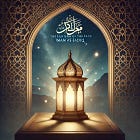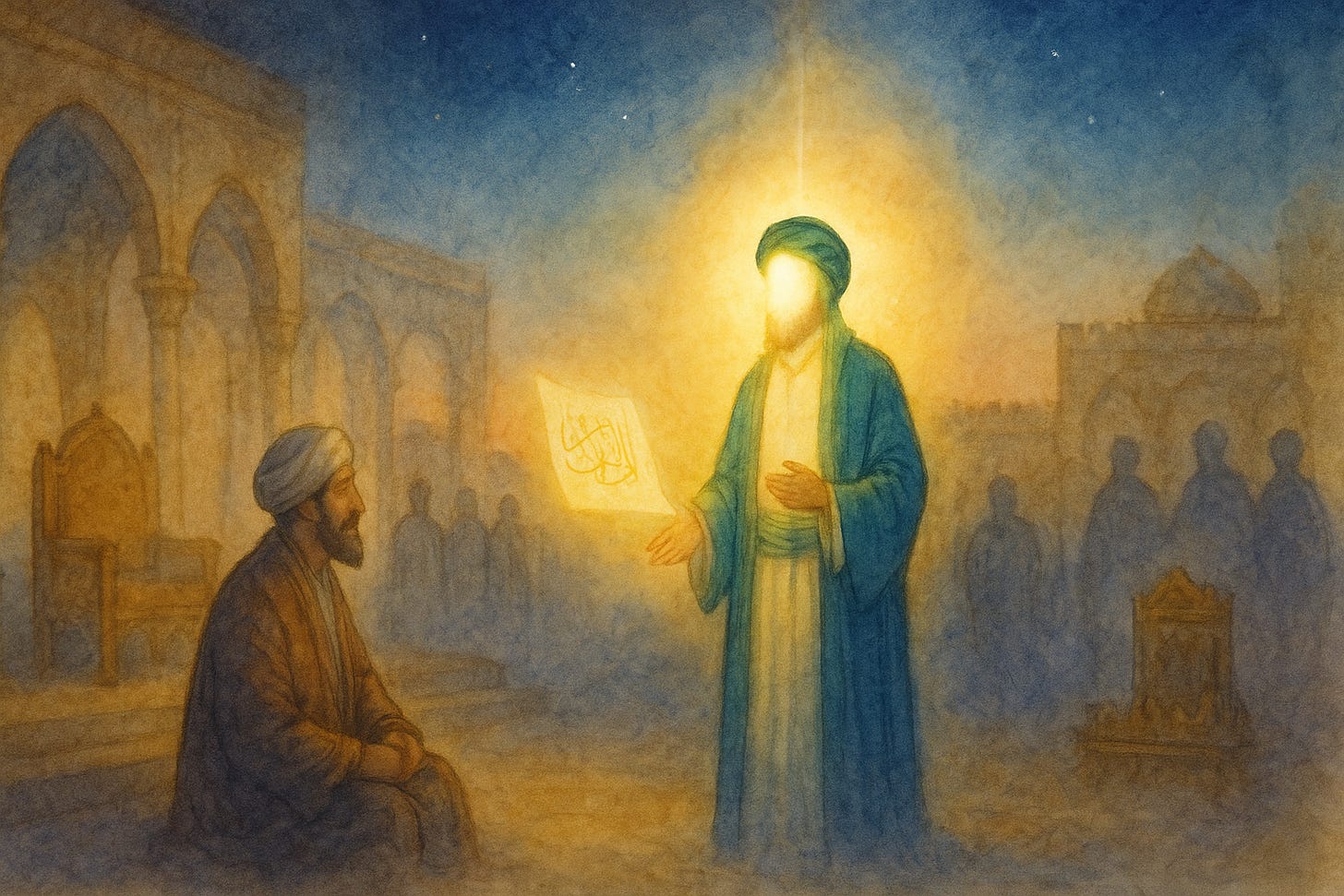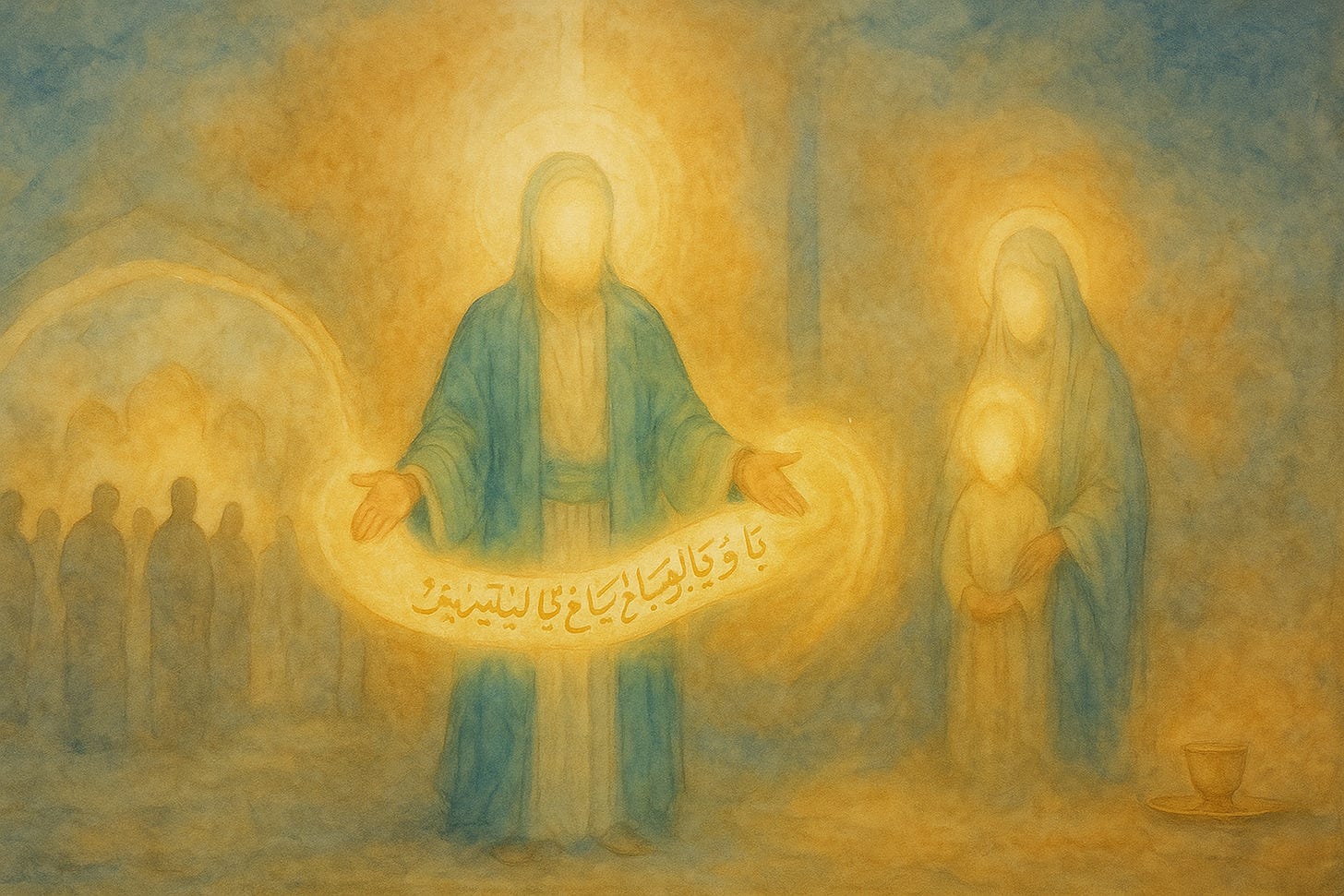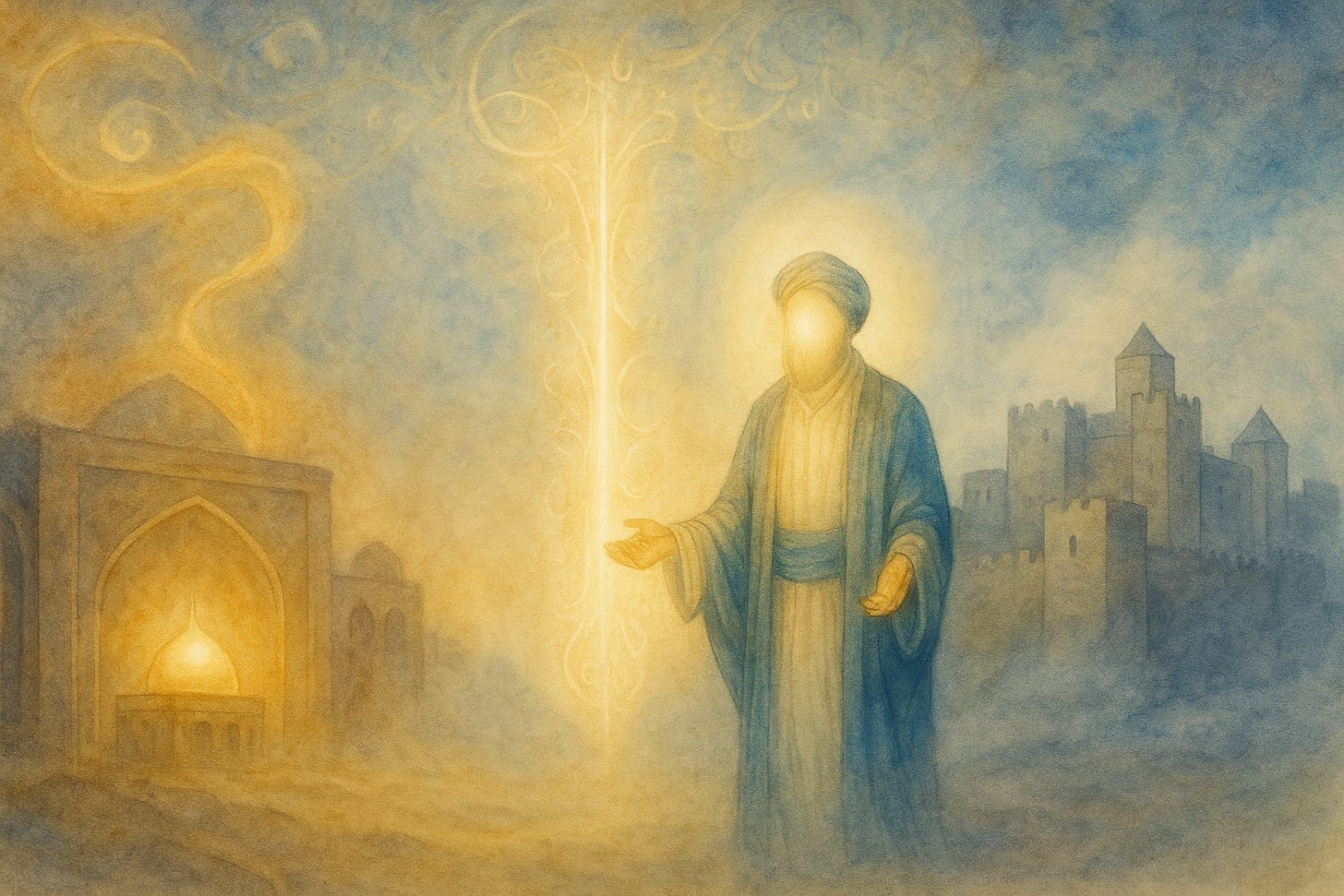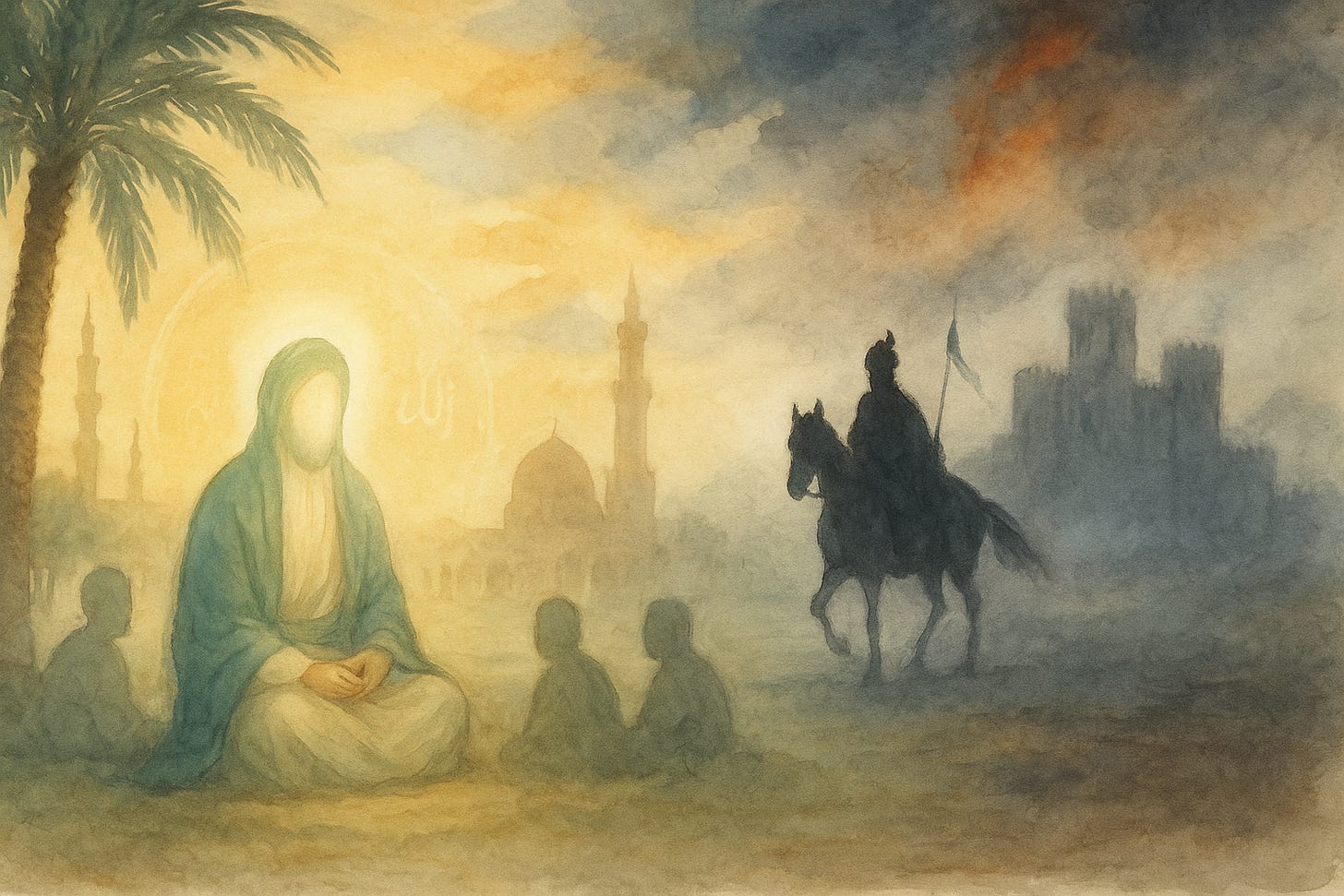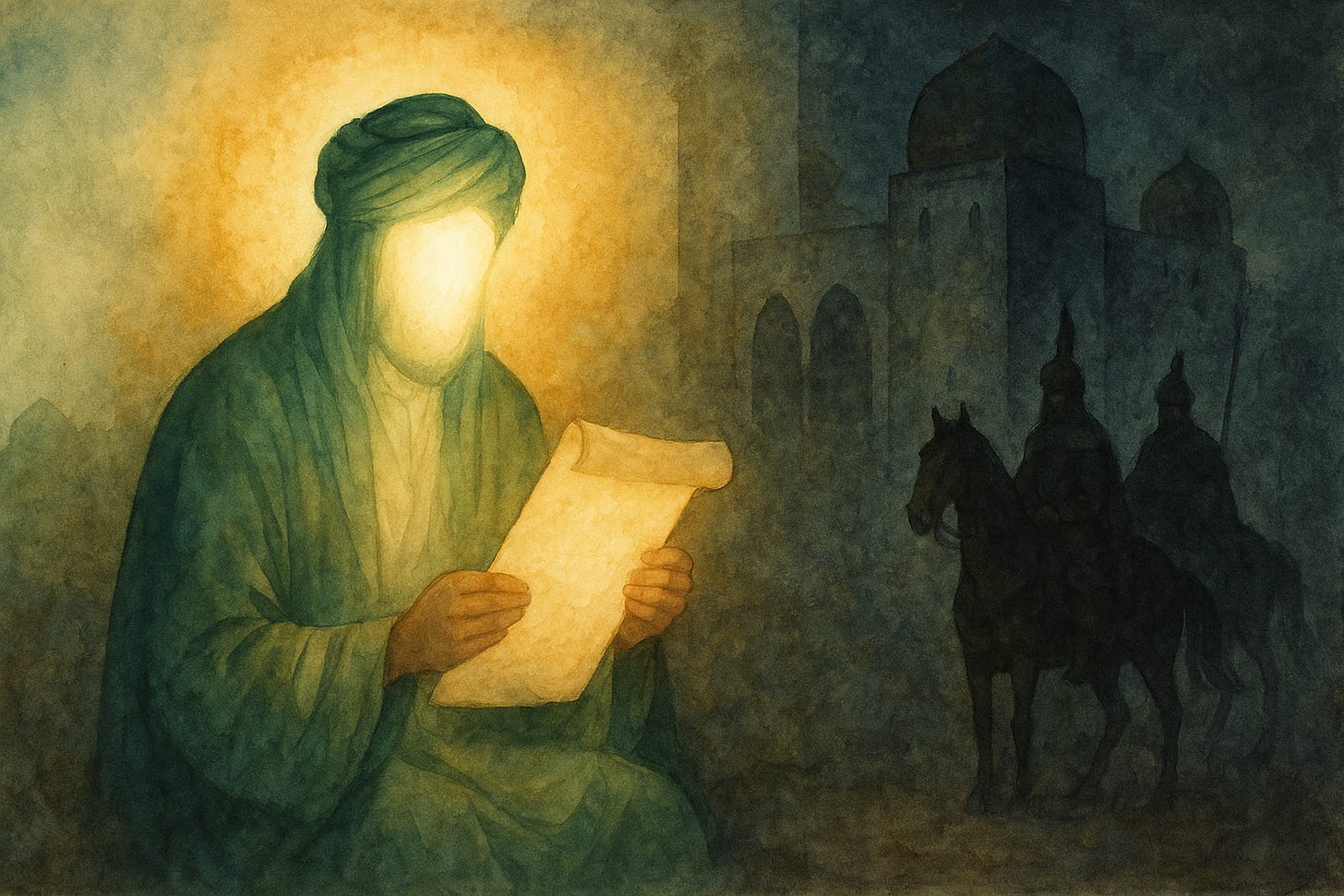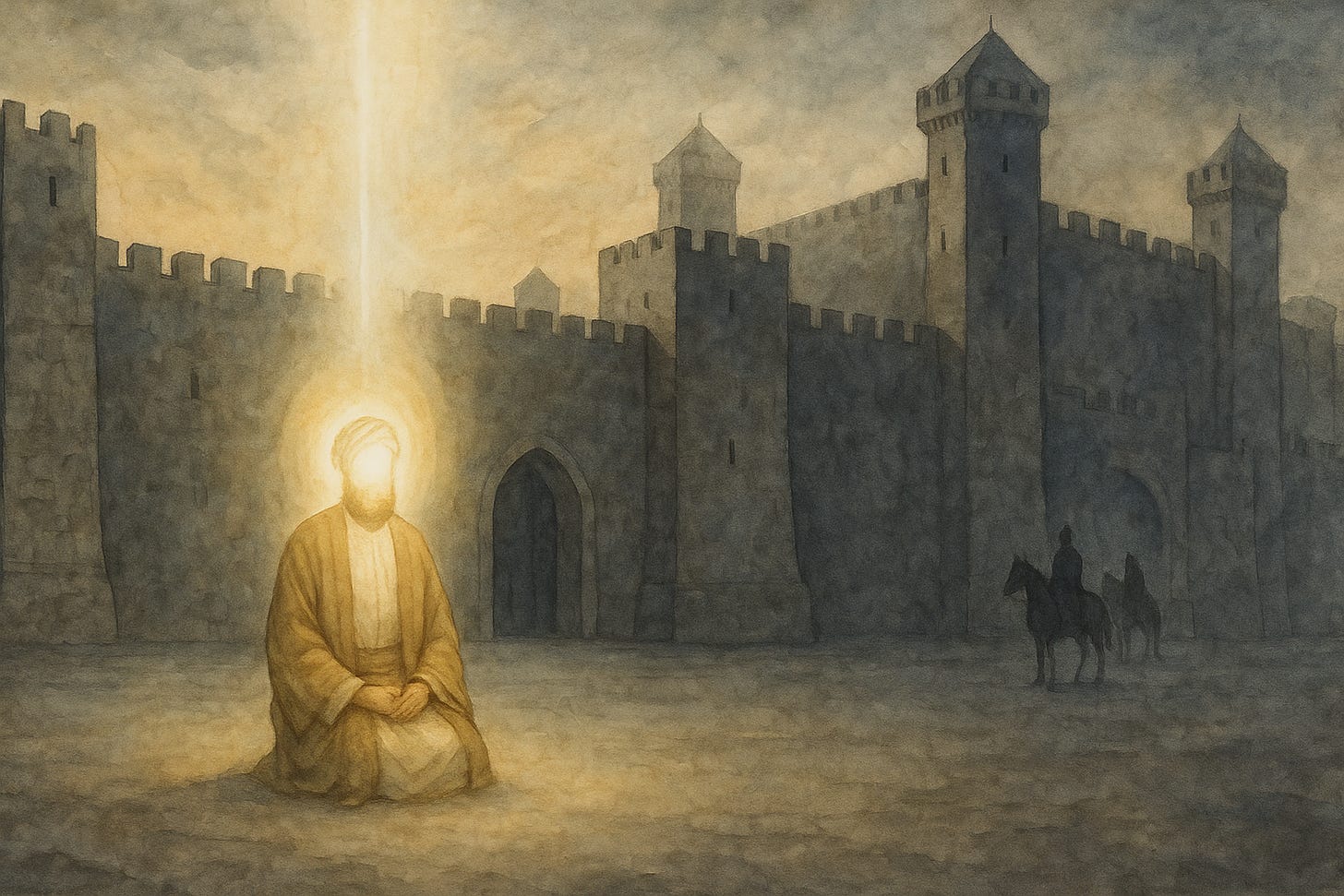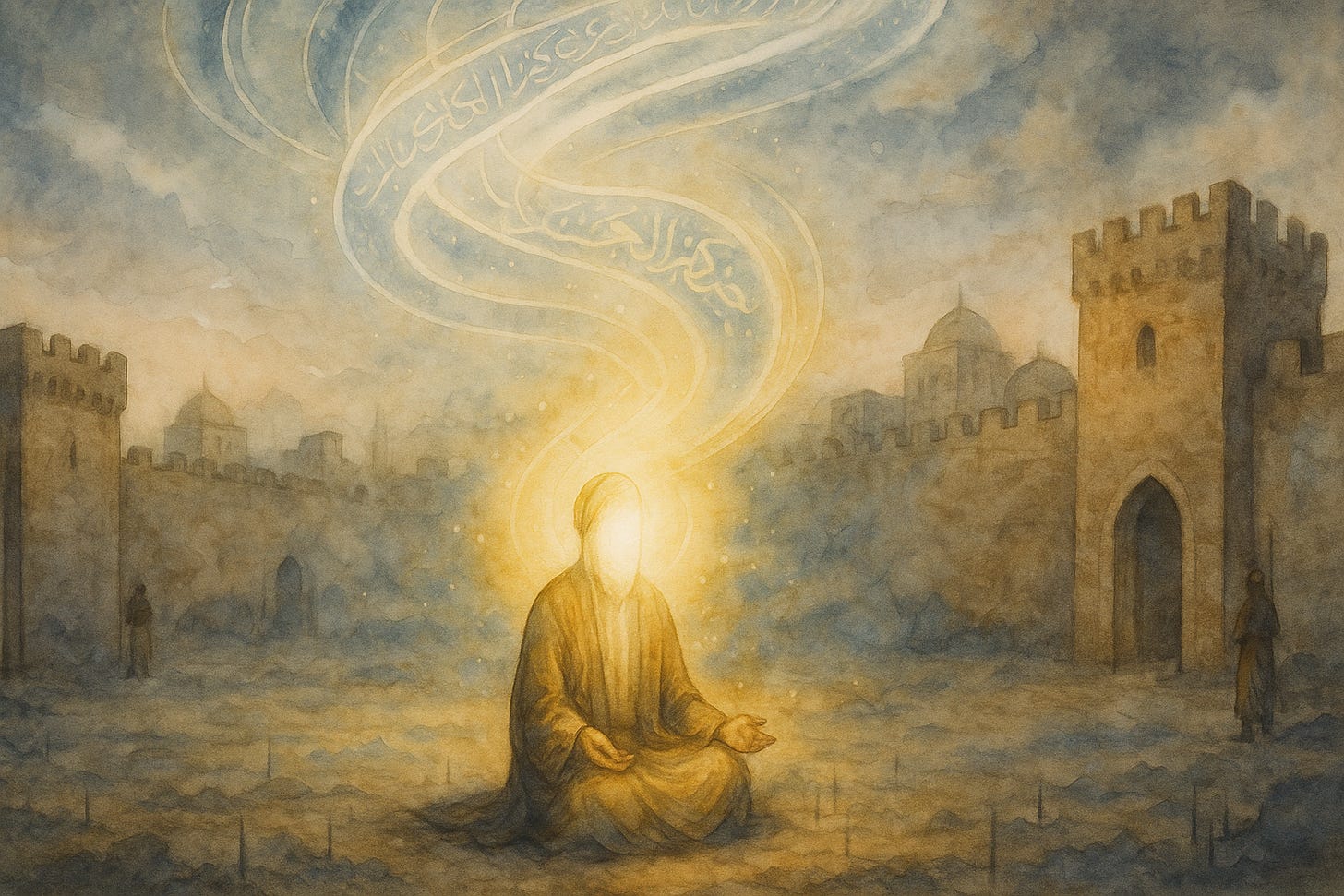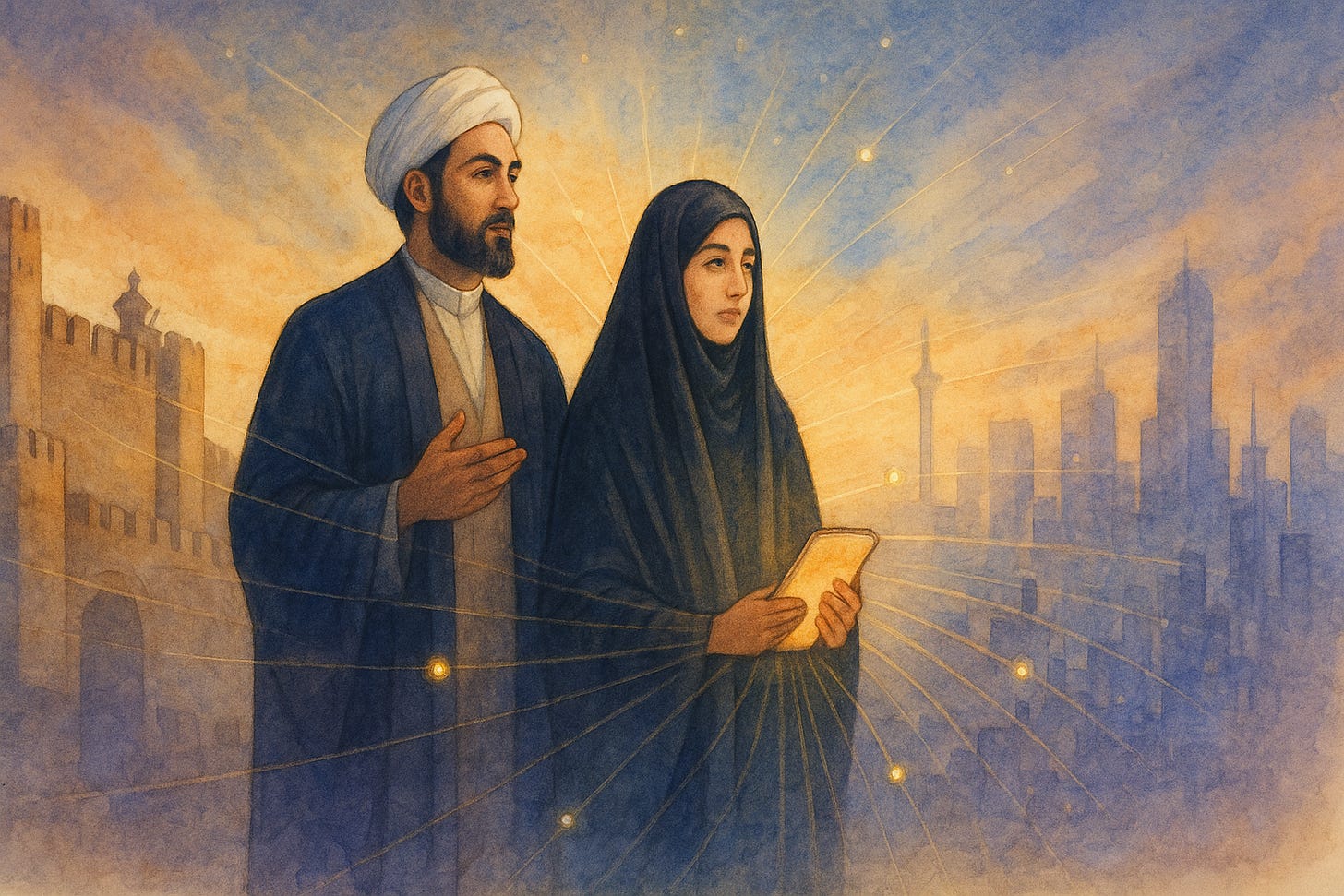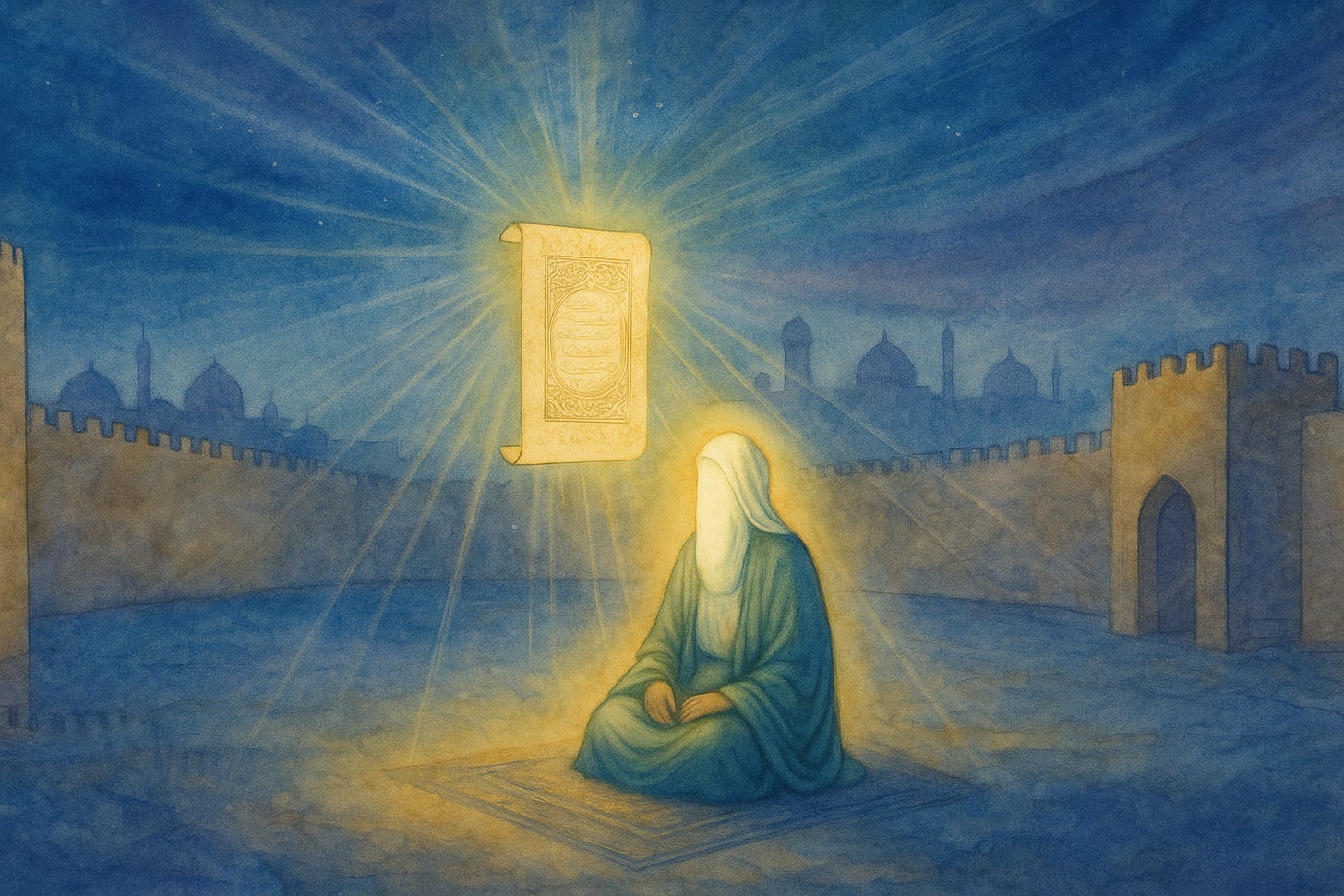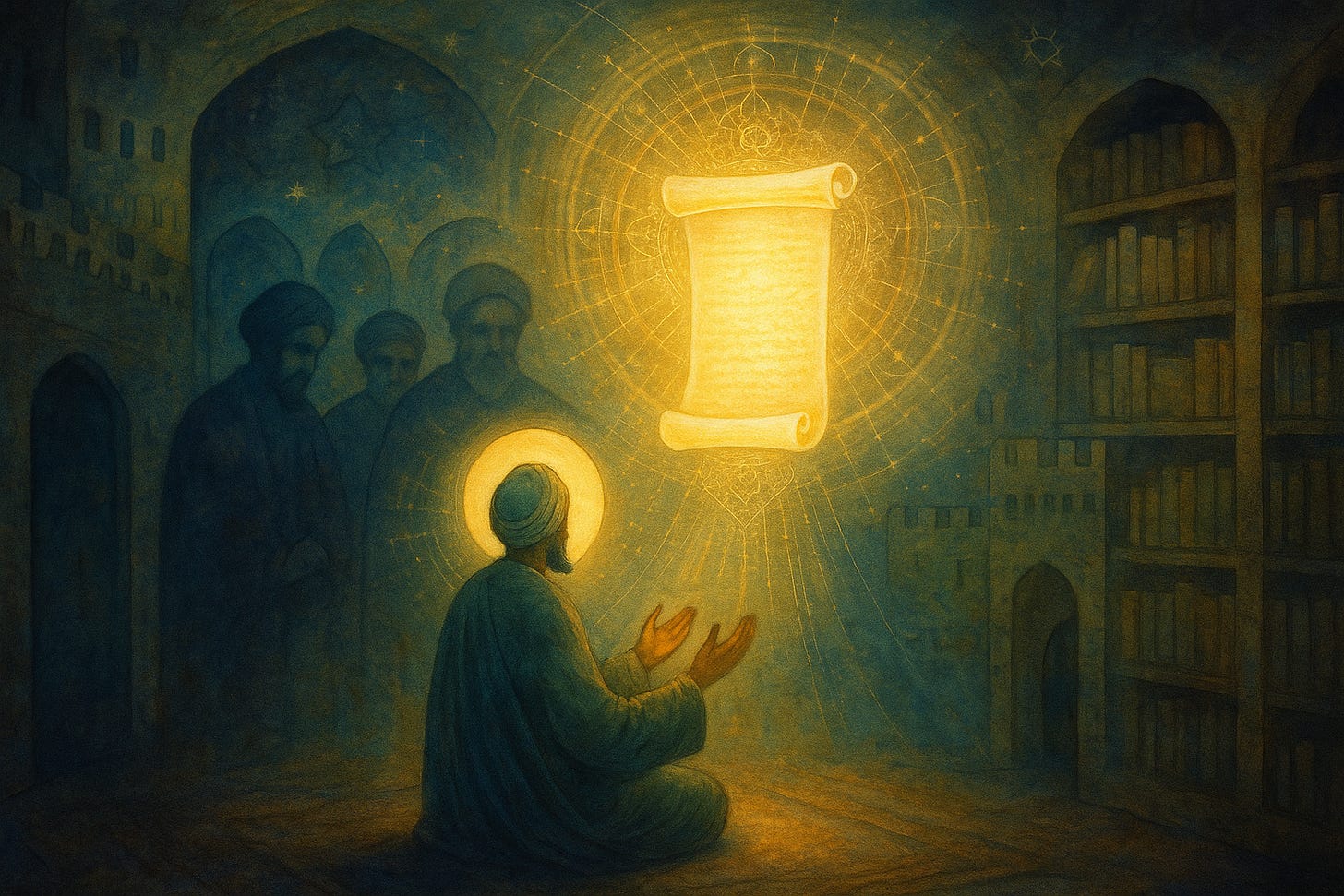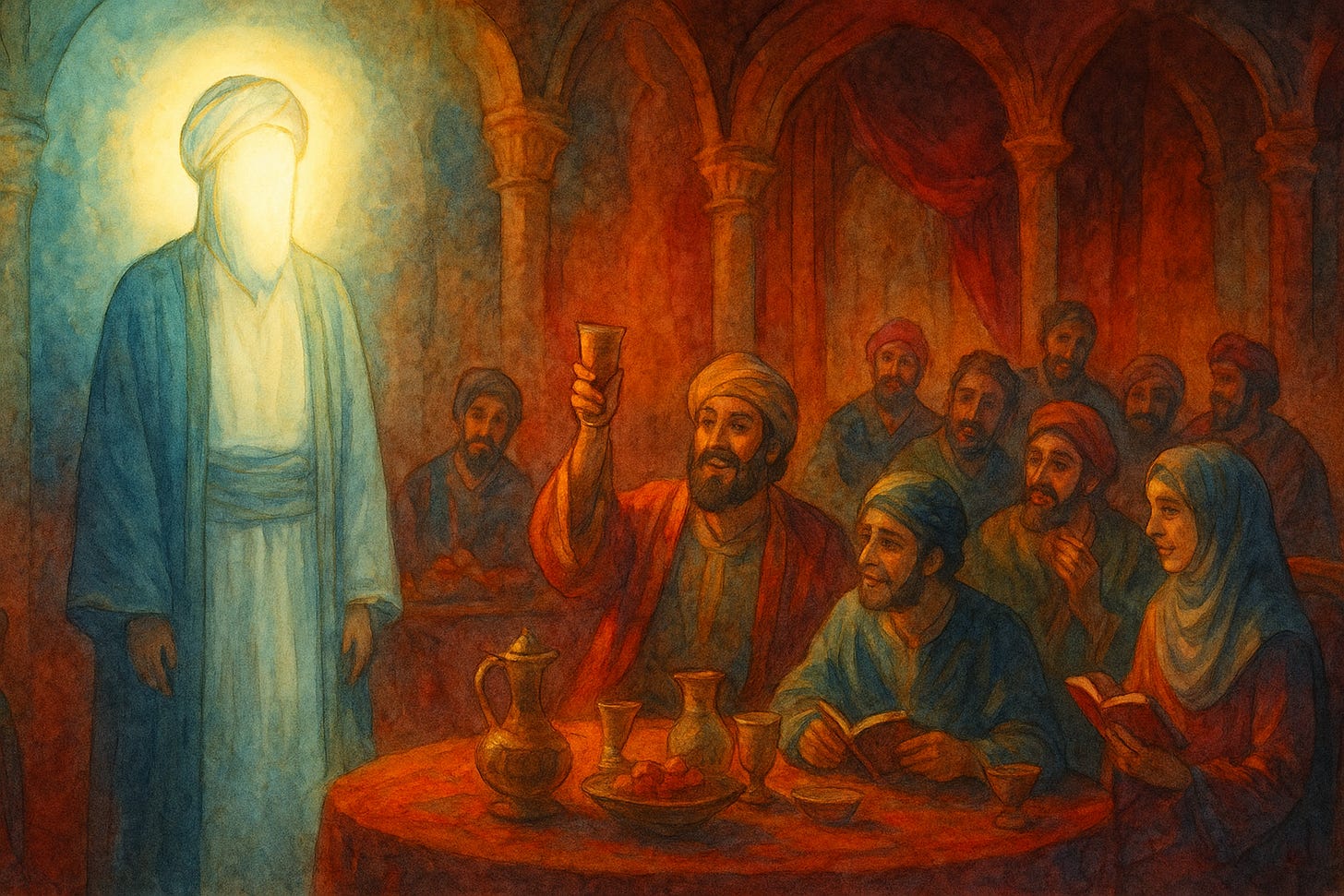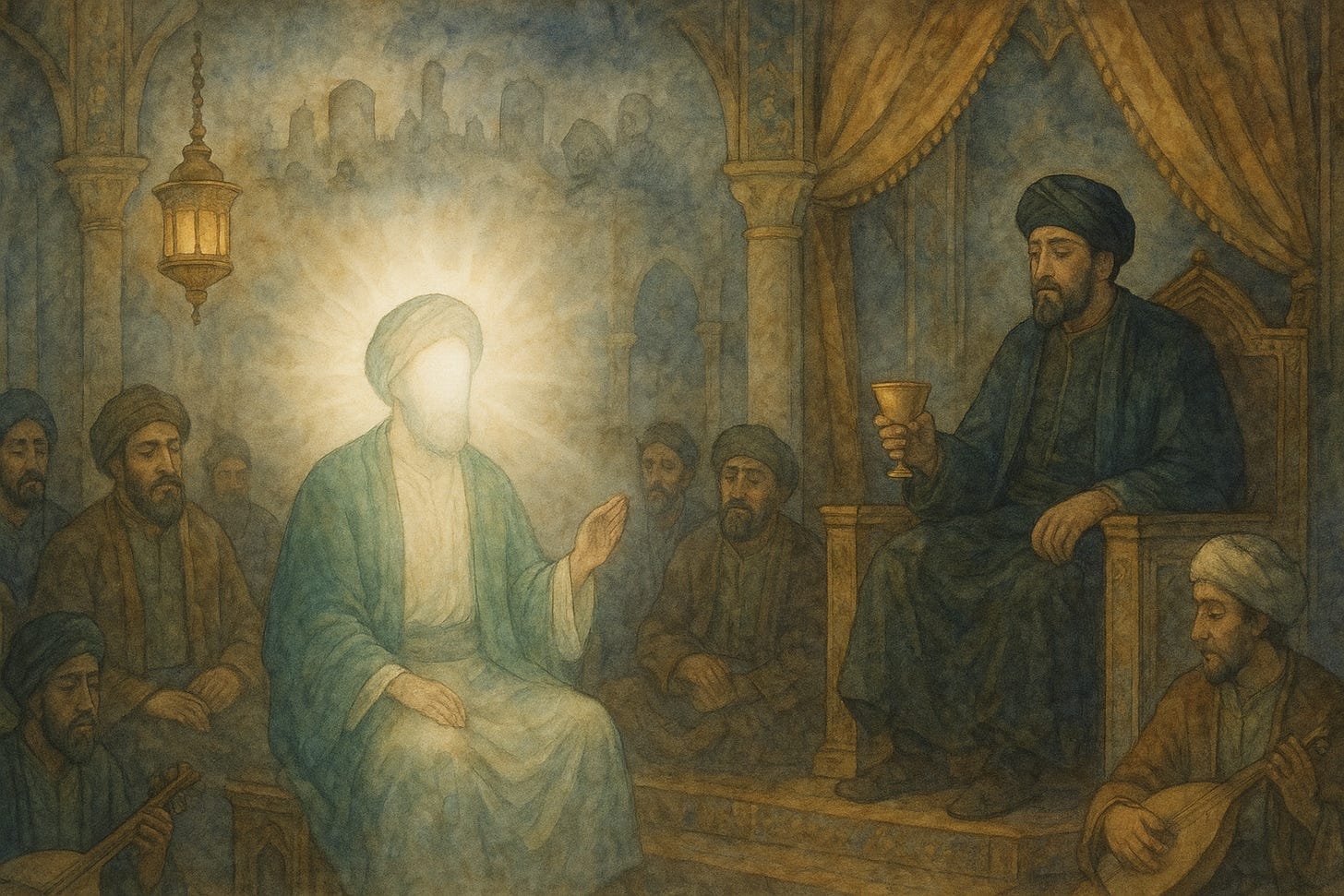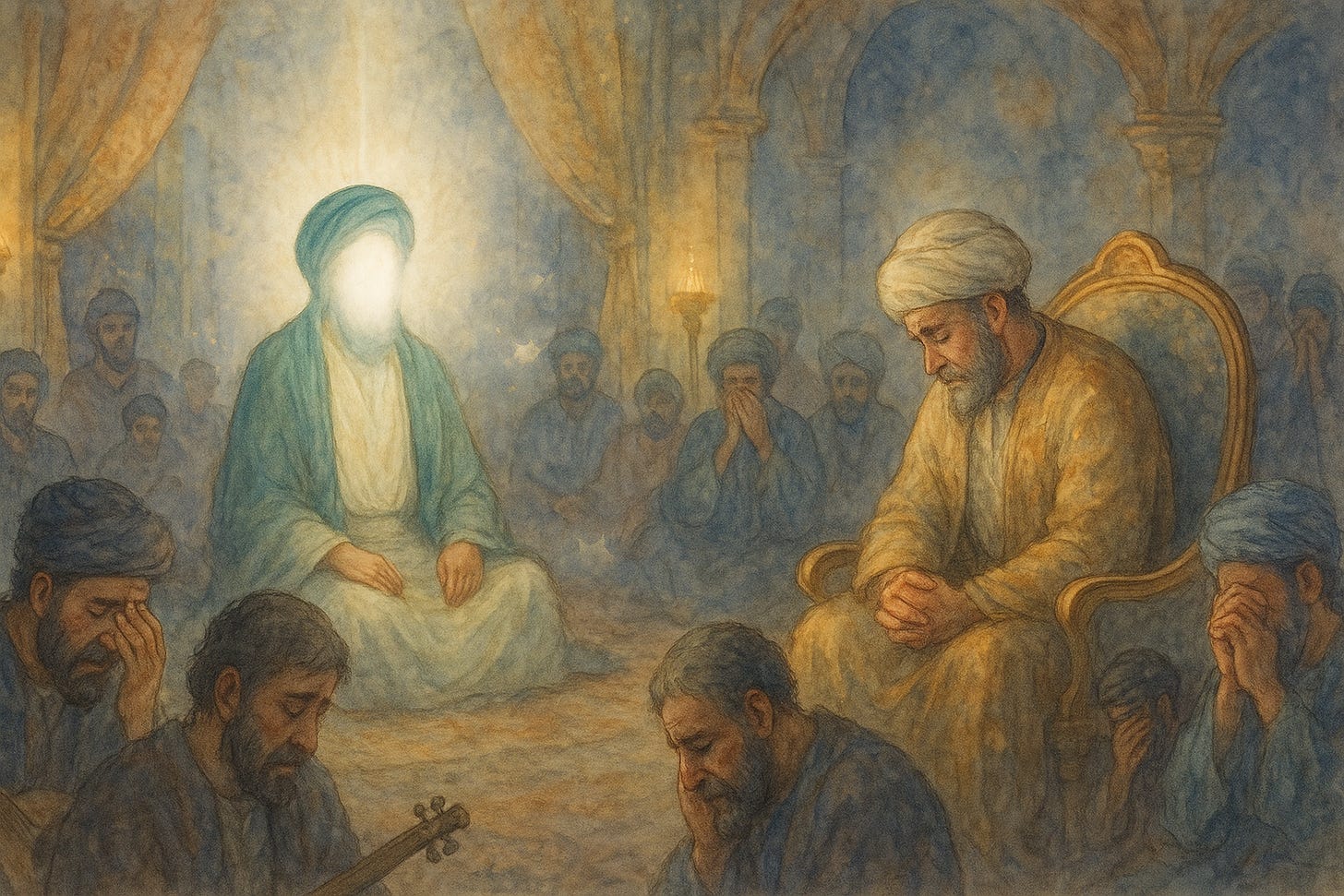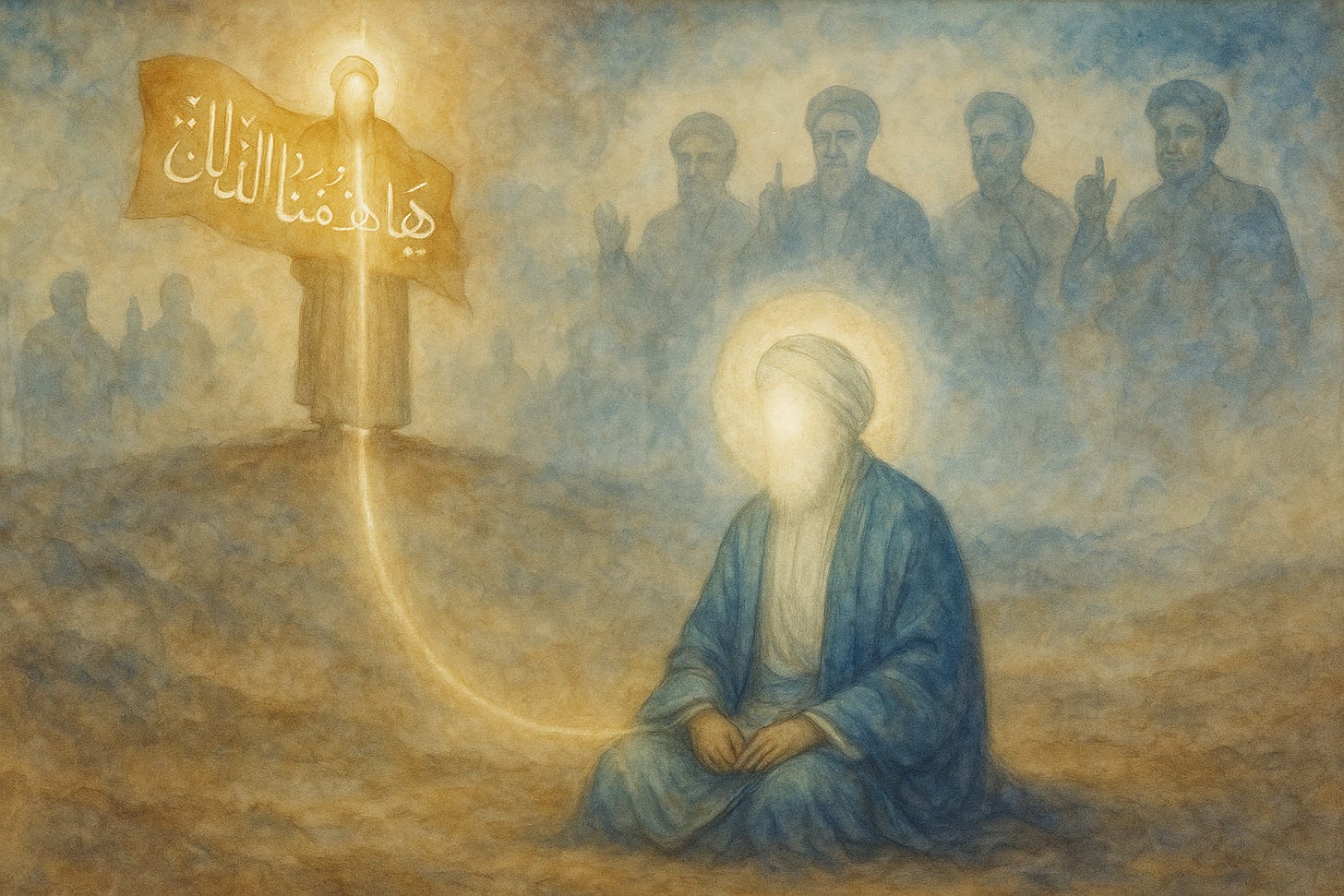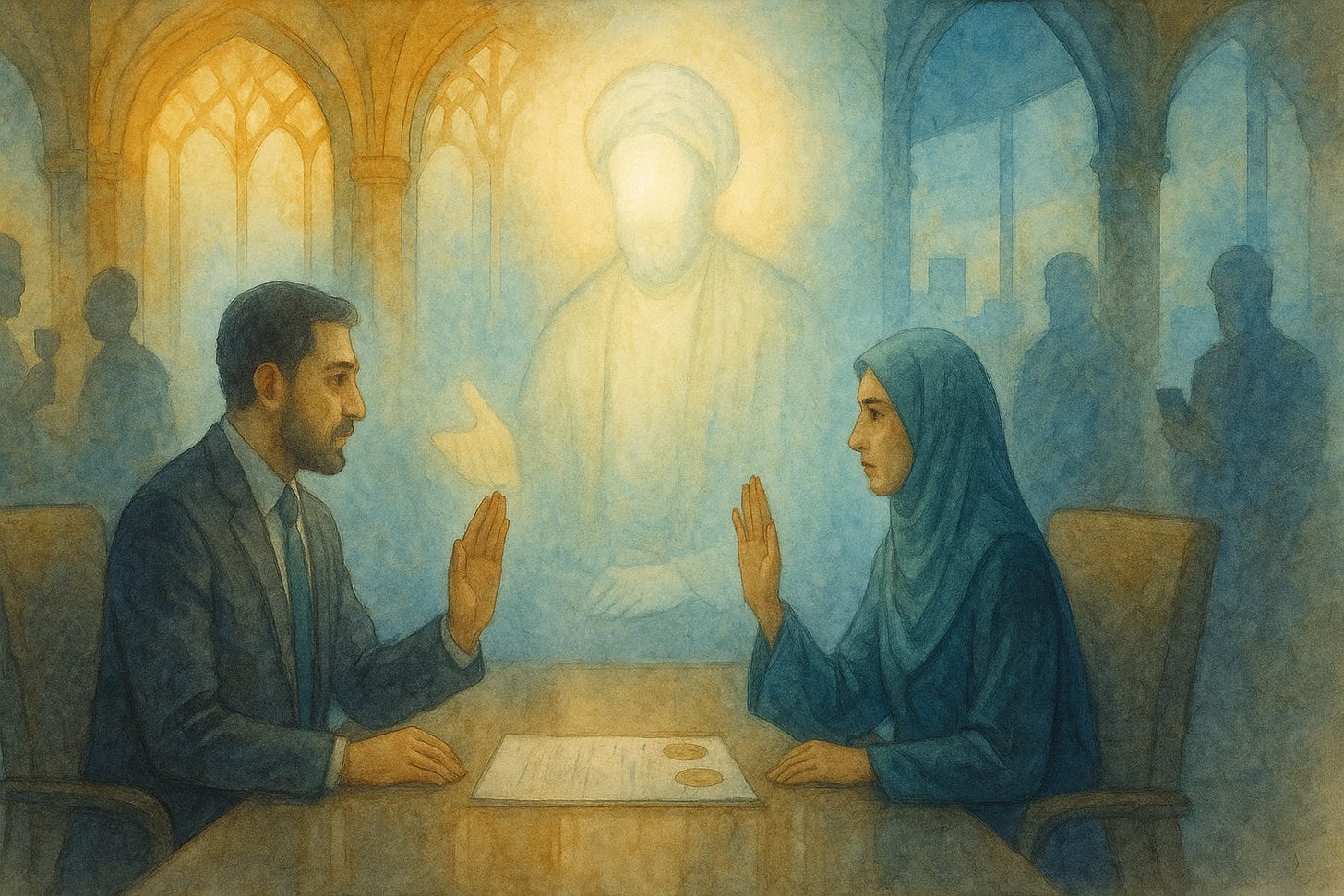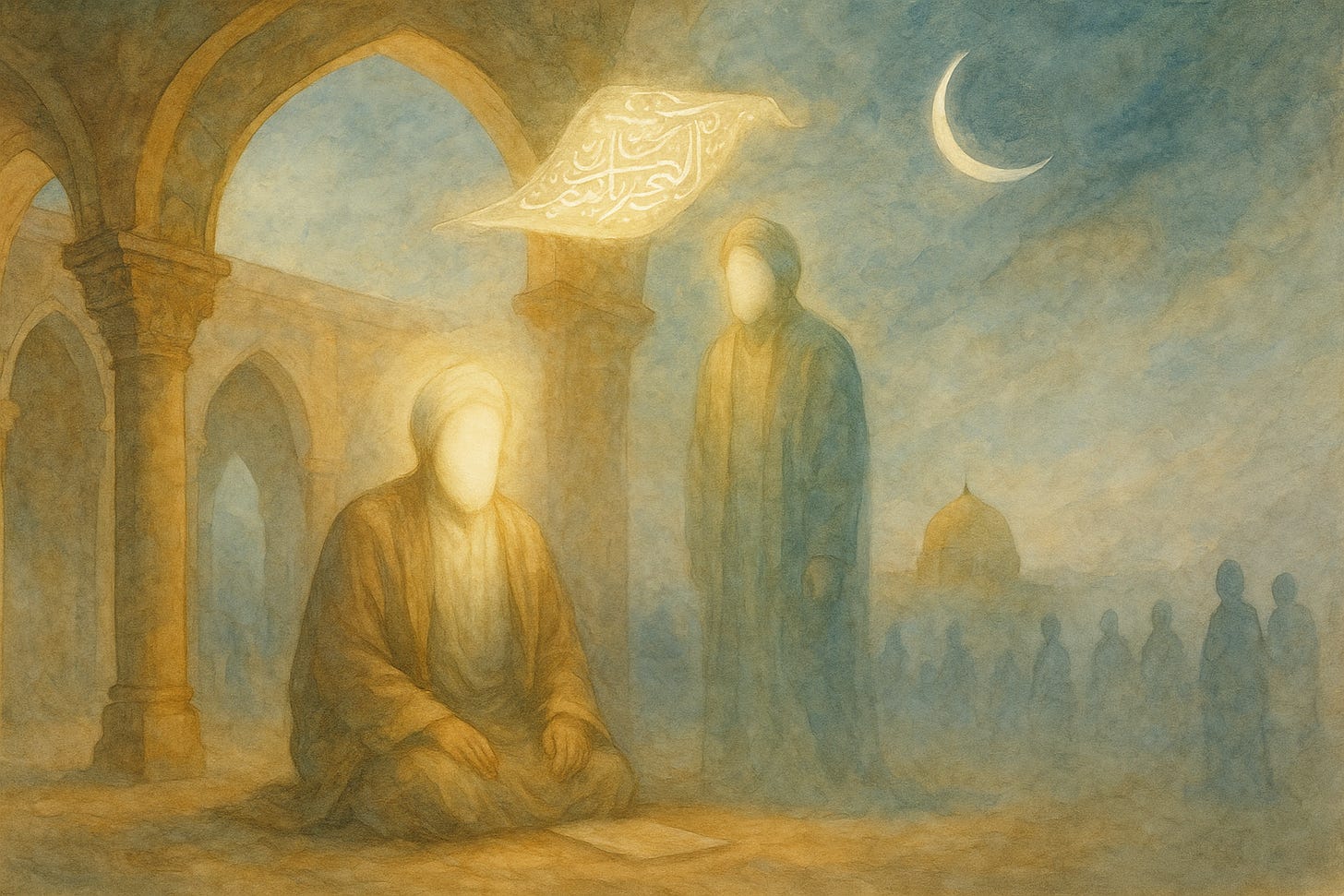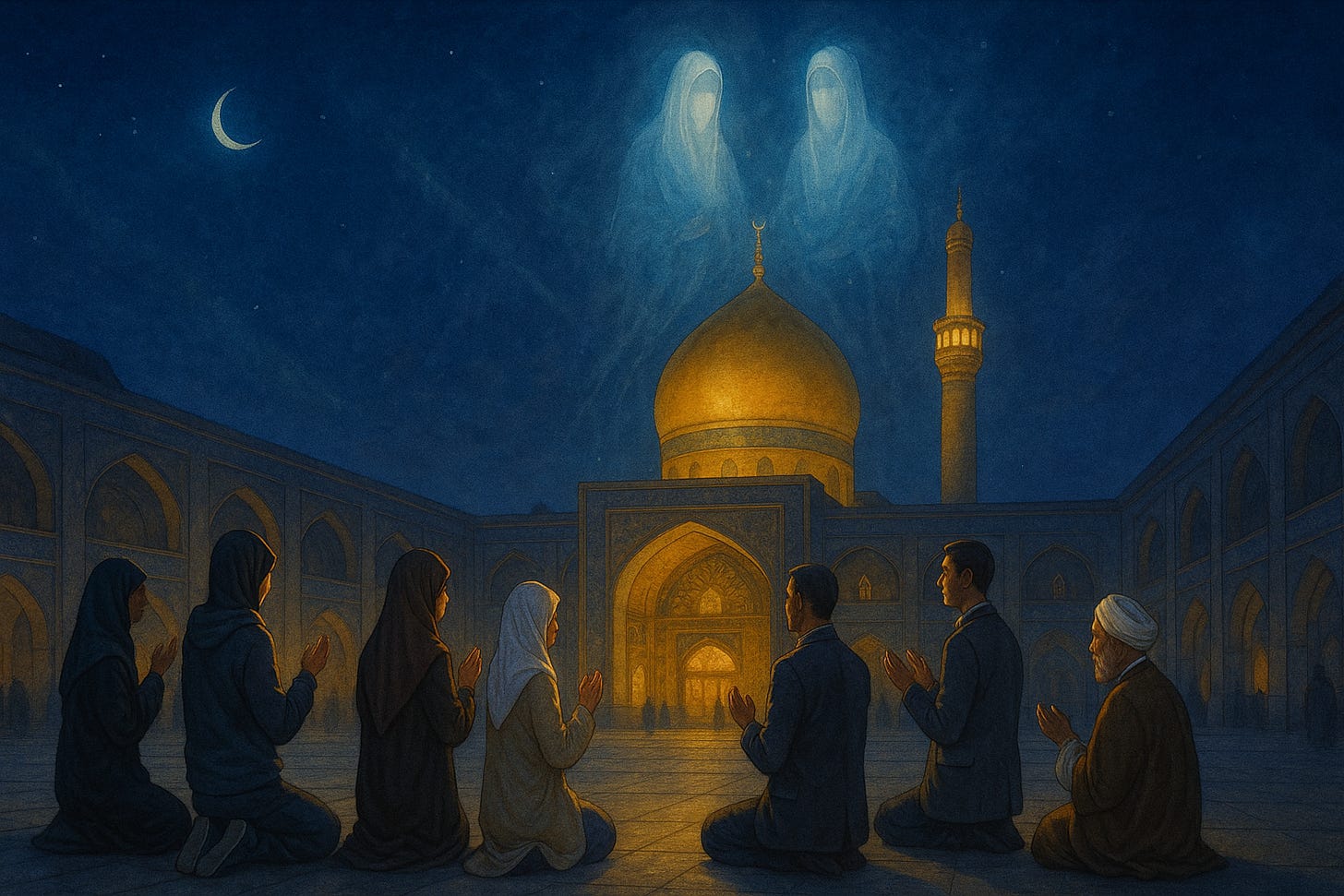[41] Imamah (Leadership) – Imam Ali al-Hadi - Part 1: The Charter of Wilayah & The Light in the Garrison
A series of discussions on the teachings of Imam Sadiq (sixth Imam of the Muslims), from the book Misbah ash-Sharia (The Lantern of the Path)
In His Name, the Most High
As the luminous torch of Imamate passes from one bearer to the next, so too does our understanding build, session upon session, into a single, interconnected tapestry of divine guidance.
Over our last two gatherings, we journeyed with the ninth Imam, Muhammad ibn Ali al-Jawad. We witnessed his God-given wisdom that defied age, his courage that unmasked a pious tyrant, and his spiritual protection that sheltered a besieged community. We saw him transform a gilded cage into a pulpit of truth, bequeathing to us not just intellectual treasures, but a fortress of faith in his sacred Hirz.
That legacy of youthful authority and profound generosity is the essential preface to our session today. For the torch of divine guidance, though extinguished in one bearer by the cowardice of poison, is never truly put out. It ignites immediately, and with renewed intensity, in the next.
Today, we turn our hearts to the tenth Imam, the son of the Generous One, Imam Ali ibn Muhammad al-Hadi (peace be upon him).
His story is not separate from his father’s; it is the intensification of the same divine resistance. Where his father was summoned to Baghdad, he would be dragged to Samarra. Where his father faced a gilded cage, he would face an actual garrison. Where his father planted seeds of guidance, he would nurture them into a vast, underground network that would sustain the faithful through the coming occultation.
This is the story of a light that refused to be imprisoned.
It is the story of Wilayah transcending physical walls and a divine charter that no earthly power could revoke. This is the chronicle of the Imam who perfected the art of leading a global movement from within the heart of a military fortress.
With the epic of Imam al-Jawad fresh in our minds, we now turn to his son: Imam Ali al-Hadi—the Light in the Garrison.
While we recommend that everyone review the previous parts in order so as to gain the most from this cumulative study, we have included this brief recap to set our context.
Let us now proceed, imploring God to help us in our endeavour: to open our hearts to true learning, to bring us ever closer to Him and His beloved Ahl al-Bayt, and to make us from amongst those who tirelessly, sincerely and actively yearn for the return of Imam al-Mahdi, that the earth be filled with justice and equality, as it is filled with injustice and tyranny.
The previous parts can be found here:
Video of the Majlis (Sermon/Lecture)
This is the video presentation of this write-up as a Majlis (part of the Truth Promoters Weekly Wednesday Majlis Program)
Audio of the Majlis (Sermon/Lecture)
This is the audio presentation of this write-up as a Majlis (part of the Truth Promoters Weekly Wednesday Majlis Program)
Recap
The Imam of Clarity and the Fortress of Faith
In our last two sessions, we explored the monumental life of the ninth Imam, Muhammad al-Jawad. His story was a masterclass in divine leadership, teaching us two core lessons: that true authority flows from God, not age, and that true protection comes from tawhid (monotheism), not worldly means.
Part One: The Imam of Youthful Authority
First, we confronted the crisis of his succession at just eight years old, following the martyrdom of his father, Imam al-Ridha (as). This was a profound test of faith for the community.
The Divine Proof
We found the theological foundation in the Qur’an, in the person of Prophet Yahya (John the Baptist), to whom God says:
يَا يَحْيَىٰ خُذِ الْكِتَابَ بِقُوَّةٍ ۖ وَآتَيْنَاهُ الْحُكْمَ صَبِيًّا
“O Yahya (John)! Hold the Book with power (strength).” And We gave him hukm (wisdom) while yet a child.
— Qur’an, Surah Maryam (the Chapter of Saint Mary) #19, Verse 12
This was ‘ilm ladunni—direct, God-given wisdom, independent of age.
Unmasking the Tyrant
We saw the Caliph Ma’mun’s “gilded cage” strategy—attempting to co-opt the Imam through marriage and court life.
But the Imam turned this prison into a pulpit.
In the legendary debate with the empire’s chief judge, Yahya ibn Aktham—an account detailed by Shaykh al-Mufid—the young Imam’s deconstruction of a simple fiqh question was a dazzling display of this divine knowledge, establishing his authority beyond any doubt.
Part Two: The Generous Protector
Second, we explored his role as the Generous Protector. In an era of fear, he gifted his community the famous Hirz (spiritual fortress), a profound tool of tawhid (monotheism).
The Gift of the Hirz
This supplication is a portable school of tawakkul (reliance), reminding the bearer that all protection comes from God alone:
يَا نُورُ يَا بُرْهَانُ يَا مُبِينُ يَا مُنِيرُ يَا رَبِّ اكْفِنِي الشُّرُورَ وَ آفَاتِ الدُّهُورِ...
“O Light, O Proof, O Manifest, O Illuminating! O Lord, suffice me against the evils and the calamities of time...”
— Sayyid Ibn Tawus, Muhaj al-Da’awat wa Manhaj al-’Ibadat (The Prayers’ Resort and the Devotions’ Way)
The Sacred Selection
We saw this divine providence in his own household. God provided him a sanctuary not in the political, barren marriage to Umm al-Fadl, but in the pure vessel of Sayyedah Sumanah al-Maghribiyya. She was the woman of immense piety chosen by God to bear the line of Imamate, as narrated in the traditions.
It was she whom her son, our tenth Imam, would later praise:
“...أُمِّي عَارِفَةٌ بِحَقِّي وَ هِيَ مِنْ أَهْلِ الْجَنَّةِ”
“My mother is one who has profound insight into my right, and she is from the people of Paradise.”
— Imam al-Hadi, cited in Al-Kulayni, Al-Kafi, Kitab al-Hujjah, Bab al-Mawlid Imam ‘Ali b. Muhammad
Martyrdom & Divine Continuity
Finally, we faced his tragic martyrdom at just twenty-five. As widely reported, he was poisoned at the behest of the Caliph.
The Abbasid plot to control the lineage had failed utterly: their political marriage remained childless, while the light of Imamate continued, protected, through Sayyidah Sumanah.
The Transition to the Tenth Light
When Imam al-Jawad was martyred, his son, Imam Ali al-Hadi, was also just eight years old. The Ummah faced the exact same test again.
Imam al-Jawad’s life had prepared them—and us—with three essential truths:
Authority is Divine, Not Worldly: God’s proof transcends age and worldly criteria.
Clarity Exposes Hypocrisy: A life of pure taqwa is the ultimate weapon against sophisticated falsehood.
Spiritual Fortresses Endure: True protection is found in tawakkul and reliance on God, not in worldly security.
These lessons are our foundation for today. Because while Imam al-Jawad faced the “gilded cage” of Baghdad, his son would confront the actual garrison of Samarra.
The struggle was about to intensify.
Imamah (Leadership) - Imam Ali al-Hadi: The Charter of Wilayah & The Light in the Garrison
Introduction: The Indomitable Light
Our last reflection concluded with the tragic, state-sanctioned martyrdom of Imam Muhammad al-Jawad in Baghdad in the year 220 AH. At just twenty-five years old, his light was extinguished by poison, a victim of the Abbasid regime’s deep-seated fear of divine truth.
Now, as we approach the history of his passing, we must tread with the care of a historian. Many popular and historical accounts, including those cited by al-Mas’udi, indicate that his own wife, Umm al-Fadl, the daughter of the Caliph Ma’mun, was the instrument of this treachery, carrying out the orders of the new caliph, al-Mu’tasim. This narrative serves as a powerful testament to the failure of Ma’mun’s plan to co-opt the Imamate.
However, in our methodology of seeking truth, we must also embrace scholarly precision. This is where we value the careful method of a scholar like the great Shaykh al-Mufid. In his foundational work, Kitab al-Irshad, he confirms the summons by the caliph and the death by poison, but he remains reserved on explicitly naming the perpetrator, demonstrating a historian’s caution when absolute, irrefutable proof is absent.
...و أشخصه المعتصم إلى بغداد... فلم يزل في بغداد مقيما بها حتى قبض (عليه السلام) ببغداد مسموما
“...And al-Mu’tasim summoned him to Baghdad... He continued to stay in Baghdad until he (peace be upon him) passed away in Baghdad, poisoned.”
— Shaykh al-Mufid, Kitab al-Irshad (The Book of Guidance), Volume 2, Chapter on the Life of Imam Muhammad b. ‘Ali al-Jawad
But the central, undeniable truth is this: the Abbasid scheme, whichever caliph ordered it, was an abject spiritual failure. Their plot to infiltrate and control the Imamate through a political marriage was rendered utterly barren.
The light of Imamate, the sacred trust of Wilayah, did not pass through the line of the Caliph.
It passed, by God’s decree, to his son, the inheritor of his knowledge and station, Imam ‘Ali ibn Muhammad al-Hadi. And just as his father had done, he assumed the awesome responsibility of Imamate as a child, at the tender age of eight, having been born in Madinah in 212 AH.
The vessel for this divine light was not a political princess, but a woman chosen by God for her purity: Sayyedah Sumanah al-Maghribiyya. She was a jariya, a handmaiden, whose nobility came not from worldly lineage but from her profound taqwa (piety).
Many biographical notes state she was the mother of all of Imam al-Jawad’s children, and today, she is buried in the holy Askariyyayn shrine in Samarra, a testament to her elevated station.
The most powerful testament to her grace comes from her own son, Imam al-Hadi, who is reported to have said of her:
“أُمِّي عَارِفَةٌ بِحَقِّي وَ هِيَ مِنْ أَهْلِ الْجَنَّةِ، لَا يَقْرَبُهَا شَيْطَانٌ مَارِدٌ وَ لَا يَنَالُهَا كَيْدُ جَبْبَارٍ عَنِيدٍ، وَ هِيَ مَكْلُوءَةٌ بِعَيْنِ اللَّهِ الَّتِي لَا تَنَامُ...”
“My mother is one who has profound insight into my right, and she is from the people of Paradise. A rebellious Satan does not come near her, nor does the scheming of a stubborn tyrant reach her. And she is protected by the Eye of God that never sleeps...”
— Imam al-Hadi, cited in Al-Kulayni, Al-Kafi, Kitab al-Hujjah, Bab al-Mawlid Imam ‘Ali b. Muhammad
This transition from father to son, from one generation of resistance to the next, exemplifies the core thesis of the Imams’ struggle. The enemy believes they can extinguish the light by assassinating one person, but they fail to understand that the Imamate is one continuous, divine institution.
As the Leader of the Islamic Revolution, Imam Khamenei, explains in his macro-analysis of the Imams’ lives, their struggle was a single, unified movement, adapted for different times.
“زندگی این بزرگواران، علي رغم تفاوت ظاهري... در مجموع یک حرکت مستمر و طوالني است، که از سال دهم، یازدهم هجرت شروع مي شود و ۲۵۰ سال ادامه پیدا مي کند... این بزرگواران یک واحدند، یک شخصیتند.”
“The life of these great ones (the Imams), despite apparent differences... is, as a whole, a continuous and long movement, which starts from the 10th or 11th year of Hijra and continues for 250 years... These great ones are one unit, one personality.”
— Imam Khamenei, Insan-e 250 Saleh (The 250-Year-Old Person), based on speeches, particularly the speech at the Congress on Imam Ridha (a.s.), Mashhad, Tir 1365 (Summer 1986).
The Abbasid regime, now under the notoriously anti-Shia caliph al-Mutawakkil, recognised this threat. They realised their “gilded cage” strategy had failed. Their new strategy was not co-option, but containment. Fearing the young Imam’s growing influence in Madinah, they would shift their tactics from political marriage to forced exile.
This session will cover this brutal shift.
We will see how the regime forcibly dragged the Imam from the city of his grandfather to a military garrison. We will witness how the caliph tried to humiliate the Imam, only to be morally and intellectually defeated in his own court. And we will study the timeless theological charter the Imam delivered not in a time of peace, but from within the heart of that very military prison.
This is the story of the Light in the Garrison.
From Madinah to the Garrison: The Summons and the Shift
A Light in Madinah, A Tyrant’s Fear
For thirteen years after his father’s martyrdom, Imam Ali al-Hadi lived in his ancestral home, the city of God’s Messenger (peace be upon him), Madinah. He was a man of peace, dedicated to scholarship, worship, and the quiet guidance of a community that sought him out for his unmatched knowledge and piety.
But the light of truth, by its very nature, exposes the darkness around it. And the darkness of that era was personified by the Abbasid Caliph, al-Mutawakkil.
Al-Mutawakkil was not like his predecessors. He was a tyrant defined by his vicious and public hatred for the Ahl al-Bayt. He is the caliph who, in his paranoia, infamously ordered the destruction and ploughing of the holy shrine of Imam Husayn in Karbala, banning all pilgrimage to it.
The existence of a beloved, respected, and morally superior Alid (descendent of Imam Ali) in Madinah was an intolerable threat to his fragile authority.
The Deceptive Summons
The caliph’s fear was fed by his own agents.
The governor of Madinah, Abdullah ibn Muhammad, began a campaign of slander, sending a stream of letters to the capital, warning that Imam al-Hadi was amassing funds, weapons, and followers, and that he was a “danger to the state.”
Shaykh al-Mufid details this manufactured crisis in Kitab al-Irshad. The Imam, fully aware of this slander, wrote his own letter to the caliph, refuting the accusations and exposing the governor’s lies.
Al-Mutawakkil, trapped, responded with the classic tactic of the despot: a “respectful” invitation that was, in reality, an iron-clad summons. He dismissed the lying governor to create a facade of goodwill, but immediately dispatched a military escort under Yahya ibn Harthama1 to ensure the Imam was brought to the capital.
“فكتب إليه [المتوكل] كتابا يذكر فيه أنه قد عرف كذب عبد الله بن محمد... وقد أمرتُ بتوليته حرب المدينة... وأنا مشتاق إلى لقائك... فأشخص إلى من أحببت من أهلك ومواليك.”
“He [al-Mutawakkil] wrote a letter to him [Imam al-Hadi] mentioning that he had learned of the lies of Abdullah ibn Muhammad... ‘and I have ordered him to be removed... ‘ and I am yearning to meet you...’ Therefore, come with whomever you wish from your family and servants.”
— Shaykh al-Mufid, Kitab al-Irshad (The Book of Guidance), Volume 2, Chapter on the Life of Imam ‘Ali b. Muhammad al-Hadi (as)
This “yearning” was a lie.
When the Imam arrived in Baghdad, he was met not with honour, but with humiliation. He was first ignored, and then, as al-Mas’udi notes in his history, Muruj al-Dhahab (The Meadows of Gold), he was initially forced to lodge in a Khan al-Sa’alik—a rundown inn for the poor—a deliberate and petty insult.
The Geopolitical Prison
This was the prelude to the final move. In Jumada II, 233 AH (approx. May 848 CE), the Imam was forcibly relocated to the caliph’s new capital, Samarra.
Samarra was not a civilian city. It was a purpose-built, fortified military headquarters, a geopolitical prison. The caliph had built it to house his loyal Turkic slave-soldiers, isolating himself from the general populace he no longer trusted. And into this camp, he brought the Imam.
He was not housed in a palace. He was settled in the al-Askar (military garrison) quarter, on a street named Abi Ahmad Street. This is the origin of the epithet that both he and his son would carry: al-Askari, “The One of the Camp.”
It was a title of imprisonment.
He would spend the next twenty years of his life here, under constant surveillance, a prisoner in all but name, until his martyrdom in 254 AH.
God’s Perfect Scheme
The caliph’s strategy was simple: to sever the head from the body, to “cage” the Imam’s authority by cutting him off from the vast network of his followers.
But here, we witness the profound wisdom of the Holy Qur’an. The tyrant schemes, but God is the better schemer.
وَمَكَرُوا وَمَكَرَ اللَّهُ ۖ وَاللَّهُ خَيْرُ الْمَاكِرِينَ
“And they schemed, and God schemed, and God is the best of schemers.”
— Qur’an, Surah Aal-e-Imraan (the Chapter of the Family of Imran) #3, Verse 54
What does it mean that God “schemes”?
Allamah Tabataba’i, in his masterpiece Tafsir al-Mizan, explains this concept.
The makr (scheme) of the enemy is to achieve an evil goal through hidden, treacherous means.
The makr of God is not deceit; it is the perfect and unexpected nullification of their plot, using their own actions against them to bring about the triumph of truth.
“المكر الإلهي هو إيصال العبد إلى جزاء مكره من حيث لا يحتسب... فهو جزاء سئ لمكرهم السئ، وهو مكر حسن.”
“The divine makr is to make the servant reach the consequence of his makr from where he does not expect... It is an evil requital for their evil makr, and it is (in itself) a good makr.”
— Allamah Tabataba’i, Tafsir al-Mizan, Commentary on Surah Aal-e-Imran, Verse 54
This is precisely what happened in Samarra. Al-Mutawakkil’s plot backfired in two magnificent ways.
First, by trying to humiliate the Imam, he brought a source of pure light into his own dark capital, a light he could not control, as we shall see in our next point.
Second, and more strategically, by severing the Imam’s physical access to his community, the caliph forced the Shia to perfect the very clandestine network he was trying to destroy.
This imprisonment was the divine catalyst for the most important organisational evolution in Shia history: the preparation for the Occultation.
The great martyr Ayatullah Sayyed Muhammad Baqir al-Sadr analysed this brilliantly.
He explained that the Imams were not just spiritual guides; they were building a “conscious base” that could function on its own.
The pressure of Samarra accelerated this process.
“كان الأئمة (عليهم السلام)... يمارسون بناء هذه القاعدة الواعية... من خلال شبكة من الوكلاء والارتباطات... وهذا البناء هو الذي شكّل الحصانة الحقيقية للإسلام والمجتمع.”
“The Imams (peace be upon him)... were building this conscious base... through a network of agents and communications... and this structure is what formed the true immunity for Islam and the community.”
— Ayatollah Sayyed Muhammad Baqir al-Sadr, Ahl al-Bayt: Tanawwu’ Adwar wa Wahdat Hadaf (Ahl al-Bayt: Diversity of Roles and Unity of Purpose)
The caliph built a physical prison, but the Imam, in response, finalised the construction of an organisational fortress that spanned the entire Muslim world, indeed the entire world.
Call to Clarify: Our Modern Samarra
This history is not confined to 9th-century Iraq. We all face “Samarra moments.”
We live in an age of sophisticated despots who seek to imprison us.
Their prisons are not always made of bricks; they are built from propaganda that cages the mind, from economic systems that chain us to debt, and from digital surveillance that creates a “garrison” of public opinion, where holding a principled stance leads to immediate attack or “cancellation.”
The lesson of Imam al-Hadi is not one of despair.
It is a lesson in divine adaptation.
When the enemy changes his tactics, we do not abandon our mission—we innovate our method.
The Imam’s response to the garrison was to go underground and go global.
When our speech is censored on one platform, we must build our own resilient platforms.
When our communities are atomised by individualism, we must build real-world study circles and support networks.
When the enemy’s methods are sophisticated, our response must be more so.
As Imam Khamenei has warned, in the “soft war,” the enemy’s goal is to change the “calculations” of the believers.
“امروز جنگ، جنگ نظامی نیست؛ جنگ سیاسی است، جنگ اقتصادی است، جنگ امنیتی است، و بالاتر از همه، جنگ فرهنگی و جنگ نرم است... دشمن میخواهد در محاسبات ما اثر بگذارد.”
“Today, the war is not a military war; it is a political war, an economic war, a security war, and above all, a cultural war and a soft war... The enemy wants to influence our calculations.”
— Imam Khamenei, Speech to Students, April 22, 2019 (2/2/1398 SH)
Our “Samarra moment” demands that we build resilient, ethical, and principled systems of communication, education, and community support that can function despite the scrutiny.
We must ask ourselves: is our connection to truth dependent on a fragile, centralised platform, or are we, like the Imam, building a distributed, resilient network that no tyrant can ever fully cage?
Ziyarah al-Jami’ah al-Kabirah: A Constitutional Text of Allegiance
A Gift from the Garrison: Introducing the “Comprehensive” Ziyarah
Before we analyse the Imam’s response to his imprisonment, we must introduce the doctrinal masterpiece he bequeathed from within that prison.
Many of the Shia, especially in the diaspora, may have heard its name—Ziyarah al-Jami’ah al-Kabirah—but sadly, it can be a neglected treasure, its profound depth often overlooked.
So, what is it?
A Ziyarah is a “visitation,” a supplication and a salutation that we recite to address God’s chosen proofs, the Ahl al-Bayt (as). This specific text is called Jami’ah, which means “comprehensive” or “all-encompassing,” for two beautiful reasons.
First, on a practical level, it is a universal charter of greeting.
Unlike other Ziyarat that are for a specific Imam (like Imam Husayn on Ashura), Imam al-Hadi gifted us a single, perfect text that can be recited at the shrine of any of the Imams, or all of them together.
It can even be recited from our own homes, thousands of miles away, as a profound declaration of our connection.
But second, and far more importantly, it is “comprehensive” in its content.
This text is nothing less than the most complete, eloquent, and profound theological statement on the nature, reality, and station of Imamate in our entire tradition.
It is not just a greeting; it is a complete “constitution” of Wilayah (allegiance), a charter that defines the lofty position of the Ahl al-Bayt in relation to God and to all of creation.
With that understanding, we can now truly appreciate the miracle of its birth.
The Paradox of Samarra: A Charter from a Cage
The context in which this incredible Ziyarah was given is everything.
It was not delivered in the serene environment of the Prophet’s Mosque in Madinah, nor at a grand assembly of scholars. It was given by Imam Ali al-Hadi from within the garrison-city of Samarra, while under 24/7 surveillance.
This is an act of supreme spiritual defiance.
At the very moment the worldly tyrant, Al-Mutawakkil, believed he had successfully “caged” the Imam, the Imam was busy delivering the most comprehensive, expansive, and profound definition of Imamate in our history.
He demonstrated that no physical wall can imprison a divine reality. The caliph controlled the geography, but the Imam defined the cosmos.
The Unshakeable Authority of the Text
Before we even touch its contents, we must realise what this text is.
This is not a folk-prayer or a later scholarly composition. It is a core, foundational text of the Shia creed, transmitted with the utmost reliability.
Its chain of narration is recorded by two of the most revered figures in our tradition:
Shaykh al-Saduq in his masterpiece, Man la Yahduruhu al-Faqih (He Who Has No Jurist Present).
Shaykh al-Tusi in his foundational work, Tahdhib al-Ahkam (Rectification of the Ordinances).
These are two of the Four Foundational Books (al-Kutub al-Arba’a) of the Shia hadith tradition. Its place in these books gives it an authority that is almost unparalleled.
This is why the greatest mystics and jurists of our age have held it in such awe. The late, great gnostic Ayatullah Muhammad-Taqi Bahjat was once asked about its chain of narrators (sanad).
He famously replied:
“سند زیارت جامعه کبیره خودِ متن آن است... این معارف بلند جز از لسان معصوم صادر نمیشود.”
“The chain of authority for Ziyarah al-Jami’ah al-Kabirah is its text itself... These lofty concepts could not have been issued from anyone but an Infallible.”
— Ayatullah Muhammad-Taqi Bahjat, cited in various collections of his teachings (e.g., Bahjat-e Dilha)
Ayatollah Abdullah Jawadi-Amoli, one of the foremost philosophers and exegetes of our time, has spent years delivering commentaries upon it.
He describes it as nothing less than the “constitution of Imamology.”
“زیارت جامعه کبیره، شناسنامه امام شناسی است... این زیارت، یک دوره کامل امام شناسی در عالیترین سطح است.”
“The Ziyarah al-Jami’ah al-Kabirah is the identity card of Imam-cognition... This Ziyarah is a complete course in Imamology at the very highest level.”
— Ayatollah Jawadi-Amoli, from his commentary series on Ziyarah al-Jami’ah, Adab-e Fana-ye Moqarrabin (The Etiquette of Annihilation for Those Brought Near)
The Core Content: A Declaration of Cosmic Truth
This charter is a complete re-orientation of our reality. It explains who the Imams are, not in relation to politics, but in relation to God and creation.
Lets take a look at a few stanzas or lines from it to try to understand this:
The Fount of Knowledge
مَحَالَّ مَعْرِفَةِ اللَّهِ
“...the locations of the cognition of God...”
— Ziyarah al-Jami’ah al-Kabirah
This is not just “they know things about God.”
This is a far more profound statement.
It means that the pathway to a true, non-distorted understanding of God Himself passes through them.
In an age of confusion, this is our anchor.
The Axis of Truth
وَالْحَقُّ مَعَكُمْ وَفِيكُمْ وَمِنْكُمْ وَإِلَيْكُمْ
“...and the Truth is with you, in you, from you, and to you.”
— Ziyarah al-Jami’ah al-Kabirah
In our modern world of moral relativism, where “truth” is whatever one feels it to be, this statement is an earthquake.
The Imam defines truth as something objective, real, and located.
It is not a free-floating idea; it is a reality anchored to the Infallibles.
They are the axis around which truth itself revolves.
The Ark of Salvation
مَنْ أَتَاكُمْ نَجَا وَمَنْ لَمْ يَأْتِكُمْ هَلَكَ
“...he who comes to you is saved, and he who does not come to you is destroyed.”
— Ziyarah al-Jami’ah al-Kabirah
This is the practical consequence of the Imam’s station.
It frames allegiance not as a mere cultural identity, but as a matter of spiritual life and death.
This line from the Ziyarah is a direct and beautiful tafsir (exegesis) of the famous hadith of the Prophet (peace and blessings be upon him and his family), known as Hadith al-Safinah (The Hadith of the Ark):
“إِنَّمَا مَثَلُ أَهْلِ بَيْتِي فِيكُمْ كَمَثَلِ سَفِينَةِ نُوحٍ، مَنْ رَكِبَهَا نَجَا، وَمَنْ تَخَلَّفَ عَنْهَا غَرِقَ.”
“The parable of my Ahl al-Bayt (Household) among you is that of the Ark of Noah; whoever boards it is saved, and whoever stays behind from it is drowned.”
— Prophet Muhammad
This foundational hadith is treasured in the Shia canon, narrated by pillars of our tradition such as Shaykh al-Saduq in his works, including ‘Uyun Akhbar al-Ridha (Springs of News about al-Ridha) and Al-Amali (The Dictations).
Crucially, it is also a well-established hadith within the Sunni canon, demonstrating its universal importance. The great Sunni scholar Al-Hakim al-Nishapuri includes it in his renowned collection Al-Mustadrak ‘ala al-Sahihayn (The Supplement to the Two Sahihs), and he explicitly grades it as Sahih (Authentic) according to the strict criteria of Imam Muslim.
The Modern Friction: Is This Tawhid or Shirk?
This ziyarah is, in fact, the greatest lesson in Tawhid (monotheism) and the most powerful antidote to accusations of shirk (polytheism).
The ziyarah is saturated with the understanding that the Imams are nothing of their own accord.
Their entire station is a reflection of God’s Will.
They are not partners with God; they are the supreme creations of God.
The text is explicit: they are God’s “servants” (ibadukum), “honoured” by Him (akramakum), and “appointed” by Him (ista’malakum).
The ziyarah clarifies a core principle: Tawhid and Wilayah are not in competition.
Wilayah is the gate to Tawhid.
The ziyarah states:
مَنْ وَحَّدَهُ قَبِلَ عَنْكُمْ
“He who professes God’s Oneness has accepted it from you.”
— Ziyarah al-Jami’ah al-Kabirah
This means the pure, uncorrupted, non-anthropomorphic understanding of Tawhid was taught and preserved by the Ahl al-Bayt.
To accept their guidance is to accept pure monotheism.
The great jurist and philosopher Ayatollah Misbah-Yazdi dedicated much of his life to clarifying this.
He explained that seeking help from the Imams (tawassul) is no different from using any other means God has created.
“اگر کسی وسیلهای را، چه مادی و چه معنوی، با این اعتقاد به کار گیرد که مستقلاً دارای اثر است، این شرک است. اما اگر معتقد باشد که خدا این خاصیت را به او داده و به اذن الله کار میکند، این عین توحید است... ائمه (ع) بزرگترین وسایلی هستند که خدا برای تقرب به خود قرار داده است.”
“If we use a means, whether material or spiritual, with the belief that it is an independent source of power (istiqlal dar ta’thir), that is shirk. But if we use it with the belief that God has given it this property and that it operates by His permission (bi-idhnillah), that is the very essence of Tawhid... The Imams are the greatest of the means (wasilah) that God has appointed for us to seek His closeness.”
— Ayatollah Muhammad-Taqi Misbah-Yazdi, summarised from his lectures on Imamate and Tawhid (e.g., in the Amuzesh-e Aqa’id series)
Our Manual for the Age of Occultation
This is where the ziyarah becomes most urgent for us today.
Why would the Imam, just before the Occultation, give us this detailed “constitution”?
Because when the Imam is physically absent, this charter becomes his living representative.
It is our manual for navigating the Ghaybah (Occultation).
Shaykh Alireza Panahian often speaks on this, framing the ziyarah as the tool for building an “Imam-centric” life - and it should be noted that being “Imam-centric” is identical and synonymous to being “God-centric”.
“زیارت جامعه کبیره ما را اماممحور میکند... یعنی در تمام شئون زندگی، از سیاست و اقتصاد تا خانواده و فرد، محور امام است. این زیارت ما را برای دوران غیبت تربیت میکند که چگونه با امامی که حاضر است ولی او را نمیبینیم، زندگی کنیم.”
“Ziyarah al-Jami’ah makes us Imam-centric... meaning in all affairs of life, from politics and economics to family and individual life, the Imam is the axis. This ziyarah trains us for the era of Occultation: how to live with an Imam who is present, but whom we do not see.”
— Hujjat al-Islam Alireza Panahian, summarised from various lectures on Ziyarah al-Jami’ah
This text trains us to see the Imam not as a historical figure, but as a living, present reality (al-hujjat al-qa’im).
It is the foundation for the profound ma’rifah (cognition) that is the bedrock of true allegiance. Imam Khamenei identifies this Ziyarah as a complete, Qur’an-based curriculum for this very cognition.
“این زیارت جامعه - که یکی از بهترین زیارات ماست - در حقیقت یک دورهی کامل امامشناسیِ مبتنی بر قرآن است... این عباراتی که در زیارت جامعه هست، اینها همه درس است؛ اینها همه معرفت است.”
“This Ziyarah al-Jami’ah—which is one of our best Ziyarat—is, in reality, a complete course on Imam-cognition (Imam-shenasi) based on the Qur’an... These phrases that are in the Ziyarah al-Jami’ah, all of them are lessons; all of them are ma’rifah (cognition).”
— Imam Khamenei, Speech at the Holy Shrine of Imam Ridha (as), 1 Farvardin 1376 (March 21, 1997)
It is this ma’rifah—this deep, Qur’anic understanding of the Imam—that gives us basa’irah (insight) to navigate the complex fitnas (tribulations) of the modern age, to distinguish truth from falsehood, and to hold fast to the rope of wilayah - indeed the rope of God - until the return of its final heir.
Call to Clarify: How to Use Ziyarah al-Jami’ah al-Kabirah at Home
This charter must be moved from our prayer-books to our living rooms, from mere recitation to profound implementation.
It is not a text to be “read”; it is a constitution to be “ratified” in our daily lives.
Here is a simple, practical micro-method:
The Weekly Habit: Ponder, Don’t Just Read
Take one line per week as a family (perhaps at the dinner table or on a Friday).
Read the Arabic.
Then, since it is known that sadly, most translations are often weak and don’t capture the depth of the text.
Don’t just read a single translation and move on.
Ponder the line.
Ask as a family:
“What does this really mean?”
“What is the depth here that the English word can’t capture?”
“Why this word and not another?”
This is an act of tadabbur (deep reflection), not just passive reading.
The Pairing
Find one Qur’anic verse that supports that line.
For example, if the line is
وَ خَزَنَةِ عِلْمِ اللَّهِ
“...the guardians of God’s secret”
— Ziyarah al-Jami’ah al-Kabirah
You can pair it with the verse on the ‘Ilm al-Ghayb (Knowledge of the Unseen) such as:
الِمُ الْغَيْبِ فَلَا يُظْهِرُ عَلَىٰ غَيْبِهِ أَحَدًا
إِلَّا مَنِ ارْتَضَىٰ مِن رَّسُولٍ فَإِنَّهُ يَسْلُكُ مِن بَيْنِ يَدَيْهِ وَمِنْ خَلْفِهِ رَصَدًا“He is the Knower of the Unseen, and He does not disclose His Unseen to anyone, except to a messenger whom He has chosen...”
— Qur’an, Surah al-Jinn (the Chapter of the Jinn), #72, Verses 26-27
The Behaviour
Derive one practical behaviour from that line.
If the line is
فَقَلْبِي لَكُمْ مُسَلِّ
“...and my heart is submitted to you”
— Ziyarah al-Jami’ah al-Kabirah
The behaviour is:
“This week, when I have a personal or financial problem, before I follow my own desires or the culture’s advice, I will first stop and ask, ‘What is the fiqhi (Islamic legal) ruling on this, what does the Wali al-Faqih or the Marja’ say on this, what is the Islamic position on this, and I won’t ask, while looking for loopholes?’”
This is how we transform this 9th-century charter from a prison in Samarra into a living, breathing blueprint for our lives, our families, and our communities today.
Dignified Resistance in a Palace of Wine
The Tyrant’s Test: A Plot for Humiliation
The story of Imam al-Hadi in Samarra is one of escalating psychological warfare. The caliph, Al-Mutawakkil, having failed to break the Imam’s spirit through imprisonment and surveillance, decided on a new tactic: public humiliation. He sought to shatter the Imam’s aura of piety and moral authority by forcibly dragging him into his own world of filth and debauchery.
One night, the caliph summoned the Imam to his private majlis—a court gathering overflowing with wine, music, and sycophants. This was not an invitation; it was a trap, designed to force the Imam into a no-win situation: either he would comply and be defiled, or he would refuse and give the tyrant a pretext for his execution.
The Confrontation and the Dignified Refusal
The historical sources, including al-Mas’udi in his chronicle Muruj al-Dhahab (The Meadows of Gold), paint the scene. The Imam was brought before the caliph, who was already deep in his cups.
Al-Mutawakkil, holding a cup of wine, offered it to the Imam, the Wali of God.
In this moment of supreme tension, the Imam did not flinch.
He did not waver.
He simply and firmly replied:
“وَاللَّهِ مَا خَامَرَ لَحْمِي وَدَمِي قَطُّ، فَاعْفِنِي.”
“By God, it (wine) has never mixed with my flesh and my blood. So exempt me.”
— Imam al-Hadi, cited in Al-Mas’udi, Muruj al-Dhahab, Volume 4
This is the first lesson in principled resistance: a clear, unequivocal, and dignified refusal of the haram.
He did not make an excuse; he stated a fact of his pure existence.
The Power of Admonition: A Poem as a Sword
Thwarted and embarrassed, the caliph did not relent.
He pressed on: “Then, recite some poetry for me.”
The Imam replied, “I am little given to reciting poetry.”
“You must!” the caliph insisted.
Here, the Imam makes a profound choice.
He is being commanded to “entertain” the tyrant.
Instead, he seizes the opportunity.
He accepts the “invitation” to speak, but he does not recite poetry of wine, or women, or flattery.
He recites a poem that shatters the very foundations of the caliph’s worldly arrogance.
From the heart of the majlis of debauchery, the Imam recites a piercing sermon on death:
“بَاتُوا عَلَى قُلَلِ الْأَجْبَالِ تَحْرُsُهُمْ ... غُلْبُ الرِّجَالِ فَلَمْ تَنْفَعْهُمُ الْقُلَلُ وَاسْتُنْزِلُوا بَعْدَ عِزٍّ مِنْ مَعَاقِلِهِمْ ... وَأُسْكِنُوا حُفَرًا يَا بِئْسَ مَا نَزَلُوا نَادَاهُمْ صَارِخٌ مِنْ بَعْدِ مَا قُبِرُوا ... أَيْنَ الْأَسِرَّةُ وَالتِّيجَانُ وَالْحُلَلُ؟ أَيْنَ الْوُجُوهُ الَّتِي كَانَتْ مُنَعَّمَةً ... مِنْ دُونِهَا تُضْرَبُ الْأَسْتَارُ وَالْكِلَلُ؟ فَأَفْصَحَ الْقَبْرُ عَنْهُمْ حِينَ سَاءَلَهُمْ ... تِلْكَ الْوُجُوهُ عَلَيْهَا الدُّودُ يَقْتَتِلُ”
“They spent the night on mountain peaks, guarded by... mighty men, but the peaks did not benefit them. And they were brought down, after glory, from their strongholds... and made to dwell in pits. What a wretched place they descended to! A caller cried out to them after they were buried... ‘Where are the thrones, the crowns, and the royal robes?’ ‘Where are the faces that were once delicate... before which curtains and veils were drawn?’ And the grave eloquently replied to them... ‘Those faces... upon them, the worms now battle.’”
— Imam al-Hadi, cited in Al-Mas’udi, Muruj al-Dhahab, Volume 4
The Moral Victory: Jihad of Clarification
The effect was instantaneous. The raw, vivid, and undeniable truth of the grave cut through the caliph’s intoxication.
The poem acted as a mirror, forcing the tyrant to see his own pathetic mortality. The sources state that Al-Mutawakkil, the most brutal caliph of his age, wept uncontrollably, his tears soaking his beard.
The entire majlis was reduced to tears.
This is the pinnacle of Jihad al-Tabyeen (the Jihad of Clarification).
The Imam did not compromise his principles, but he also did not invite his own execution with a reckless insult. He used profound wisdom (hikmah) to speak a word of truth that dismantled the tyrant’s arrogance from within.
The caliph, completely undone, ordered the wine removed and the Imam returned to his home, not with humiliation, but with honour.
The Imam had turned the caliph’s court into his own pulpit.
The source of this incredible courage is a purely Qur’anic principle: when one’s fear is reserved only for God, there is no fear left for anyone else.
“الَّذِينَ يُبَلِّغُونَ رِسَالَاتِ اللَّهِ وَيَخْشَوْنَهُ وَلَا يَخْشَوْنَ أَحَدًا إِلَّا اللَّهَ ۗ وَكَفَىٰ بِاللَّهِ حَسِيبًا”
“[Prophets are] those who convey the messages of God and fear Him, and fear no one but God. And sufficient is God as an Accountant.”
— Qur’an, Surah al-Ahzab (the Chapter of the Confederates) #33, Verse 39
The Inheritance of Karbala: Dignity Over Humiliation
This stance of dignified refusal is the inheritance of the Ahl al-Bayt (as). It is the echo of Imam Husayn on the plains of Karbala. It is the practical application of his timeless cry:
هَيْهَاتَ مِنَّا الذِّلَّة
“How far from us is humiliation!”
This is not a historical relic. It is the living, breathing methodology of righteous resistance today.
Imam Musa al-Sadr, in his quest to awaken the deprived, built his entire movement on restoring this sense of God-given dignity.
“الإنسان هو القيمة العليا في هذا الكون... كرامة الإنسان هي أثمن ما في الوجود، ويجب أن تصان.”
“The human being is the highest value in this universe... Human dignity is the most precious thing in existence, and it must be protected.”
— Imam Musa al-Sadr, from his speeches and writings (e.g., Abjadiyyat al-Hiwar)
Ayatollah Sayyed Muhammad Husayn Fadhlullah framed this as the difference between the “logic of power” and the “power of logic.” The caliph had the logic of power; the Imam had the power of logic and truth.
“لا تكن ضعيفاً أمام الأقوياء... كن قوياً بالمنطق، قوياً بالحجة، قوياً بالموقف. إن موقفك هو سلاحك.”
“Do not be weak in front of the strong... Be strong with logic, strong with proof, strong with your stance. Your stance is your weapon.”
— Ayatollah Sayyed Muhammad Husayn Fadhlullah, from his Jumu’ah Khutbahs
This principle is the very essence of the “Axis of Resistance.”
When Imam Khamenei speaks of Jihad al-Tabyeen, he is speaking of this exact act: dismantling the enemy’s narrative.
“جهاد تبیین یک فریضه است... یعنی حقیقت را در مقابل تحریف دشمن آشکار کردن. این همان کاری بود که ائمه ما کردند.”
“The Jihad of Clarification is an obligation... it means to make the truth manifest in the face of the enemy’s distortion. This is the very thing our Imams did.”
— Imam Khamenei, synthesised from various speeches on Jihad al-Tabyeen
We saw this embodied in the dignified struggle of the late Martyr Sayyed Hassan Nasrallah, who built a culture of honour in the face of overwhelming terror.
“العيش بذلٍّ وهوان لا نريده... كرامتنا أغلى من دمنا. نحن قوم لا نتحمل الذل.”
“A life of humiliation and disgrace, we do not want it... Our dignity is more precious than our blood. We are a people who do not tolerate humiliation.”
— Sayyed Hassan Nasrallah, summarising the spirit of his speeches, particularly post-2006
And we hear this same Husayni voice today from Sayyed Abdul Malik al-Houthi, who stands against global bullies with the exact same logic as Imam al-Hadi.
“هيهات منا الذلة... هذا هو الموقف الذي ينسجم مع انتمائنا الإيماني وهويتنا. لن نخضع ولن نستكين أمام طغاة العصر.”
“How far from us is humiliation!... This is the stance that is harmonious with our faithful belonging and our identity. We will not submit and we will not be subjugated before the tyrants of the age.”
— Sayyed Abdul Malik al-Houthi, from various speeches on the path of Imam Husayn
Call to Clarify: Our “Mutawakkil’s Court”
This is the crescendo of our session, because this is our most practical, daily test.
We all face “Mutawakkil’s Court,” and it takes many forms.
Sometimes, the court is personal and unavoidable. It is the high-pressure work meeting or family gathering where the “wine” being served is not alcohol, but something just as intoxicating and forbidden: vicious backbiting (ghibah) or slander. The court demands your silent assent or, worse, your participation, to “fit in.”
Sometimes, the court is digital. It is the social media mob where the pressure is immense to remain silent on injustice, to compromise your principles, or to join in a degenerate trend, lest you be “cancelled.”
And just as often, “Mutawakkil’s Court” is geopolitical and professional. It is the high-stakes meeting where your principles are tested against massive worldly gain.
It is the court of the business owner who is offered a lucrative, multi-million-pound contract with an entity complicit with a state that the International Court of Justice (ICJ) has plausibly accused of committing genocide.
The fiscal gain is enormous.
But the Imam’s model demands an absolute refusal.
This refusal is not only a matter of secular law, citing the Genocide Convention or human rights.
For a person of God, the primary driver is divine law. Our refusal is, first and foremost, an Islamic duty. It is a core tenet of our faith: the principle of al-Bara’a (Disavowal) from the oppressors.
God gives us a clear and terrifying command in the Holy Qur’an:
وَلَا تَرْكَنُوا إِلَى الَّذِينَ ظَلَمُوا فَتَمَسَّكُمُ النَّارُ وَمَا لَكُمْ مِنْ دُونِ اللَّهِ مِنْ أَوْلِيَاءَ ثُمَّ لَا تُنْصَرُونَ
“And do not incline toward (do not rely upon) those who do wrong, lest the Fire should touch you. And you have not, besides God, any allies, nor will you then be helped.”
— Qur’an, Surah Hud (the Chapter of Prophet Hud) #11, Verse 113
As Allamah Tabataba’i explains in Tafsir al-Mizan, the word tarkanu (to incline) is not just “joining the oppressors.” It is any slight leaning, any reliance on them, any show of complicity or partnership that strengthens them.
To sign that contract is a textbook case of rukan (inclining) toward a tyrant.
It is a direct violation of another core command:
...وَلَا تَعَاوَنُوا عَلَى الْإِثْمِ وَالْعُدْوَانِ...
“...And do not cooperate in sin and aggression...”
— Qur’an, Surah al-Ma’idah (the Chapter of the Table Spread) #5, Verse 2
It is the court of the senior executive approached by a firm that profits from social maladies—be it fraud, gambling, financial crime, the pornography industry, or entities that seek to criminalise humanitarian aid and dissent.
It is the court that demands you support policies that violate human dignity, such as abortion or the forced euthanasia of the elderly and infirm, disguised as “mercy.”
In all these courts, from the personal to the professional, Imam al-Hadi gives us a clear, two-step model for resistance:
The Dignified Refusal:
First, we must have the courage to politely but firmly refuse the haram (forbidden) and the inhumane. This is our “My flesh and blood have never mixed with it” moment.
On the personal level: The script is not to compromise, but to object. It is the courage to say, “I’m not comfortable being part of this conversation,” or, “Perhaps we shouldn’t speak about someone who isn’t here to defend themselves.”
On the professional level: The script is clear and rooted in Tawhid: “As a matter of faith and conscience, we cannot cooperate in sin and aggression,” or “Our principles forbid us from inclining toward entities plausibly accused of genocide, as commanded in the Qur’an.”
Elevate the Moment:
But the Imam’s model goes further. He teaches us that if we are given the chance—if we are “demanded” to speak—we should not just be silently present. We must use wisdom (hikmah) to speak a word of truth that elevates the moment.
On the personal level: After refusing to backbite, we can change the topic to something meaningful.
On the professional and digital level: This means not just silently declining, but stating why. It is being the one dissenting voice that posts the truth about injustice with dignity, refusing to be intimidated.
This is how we honour Imam al-Hadi.
We refuse to be humiliated.
We build our own “palaces” of dignity, refusing to let the tyrants of our age—whether they are caliphs, bosses, or social media mobs—define our reality or compromise our principles.
Conclusion
The Garrison, The Charter, and The Occultation
Today, we have walked through the garrison of Samarra with our tenth Imam, Ali al-Hadi. We have seen how the tyrant, Al-Mutawakkil, tried to cage a divine light, and how he failed utterly.
Imam al-Hadi was physically imprisoned for twenty years, but he was spiritually, intellectually, and morally free. He proved that an oppressor can confine a body, but he can never confine a mission. From within that prison, the Imam launched his counter-offensive:
He responded to the caliph’s physical prison by reframing it, turning it into the central node of a global network—a divine makr (scheme) that forced his community to mature.
He responded to the caliph’s political slander by delivering the timeless theological charter of Ziyarah al-Jami’ah al-Kabirah, a text that defines Wilayah for all time, authored from a place of apparent weakness but demonstrating absolute spiritual authority.
He responded to the caliph’s personal humiliation by demonstrating supreme moral ‘izzah (dignity) in the tyrant’s own court, transforming a majlis of wine into a sermon on death, and proving that the only true power is the power of taqwa (God-consciousness).
This entire episode was not a historical accident. It was a crucial part of the divine plan.
The lives of these three Imams—Imam al-Jawad, Imam al-Hadi, and Imam al-Askari—were a deliberate and necessary training ground. Their mission was to prepare the Ummah for the greatest challenge in its history: the Ghaybah, the Occultation of the twelfth Imam.
They had to “wean” the community off the need for a physically present, visible Imam and train them to function through a system of guidance and representation.
This is the most important lesson for us.
We are the people living in that Age of Occultation.
The training of Samarra was not for the people of the 9th century; it was for us.
Imam al-Hadi’s life teaches us that in the absence of the Imam’s physical person, our connection is maintained by adhering to the system he put in place.
And what is that system today?
It is the system of the Maraji’ (the great Jurists) and the Wali al-Faqih (the Guardian-Jurist).
This is not a political opinion; it is the direct fulfilment of our beloved Imam’s own command. In a famous tawqi’ (signed letter), Imam al-Mahdi (may our souls be his ransom, and may God hasten his return) himself gave us our marching orders for the Ghaybah:
“وَ أَمَّا الْحَوَادِثُ الْوَاقِعَةُ فَارْجِعُوا فِيهَا إِلَى رُوَاةِ حَدِيثِنَا، فَإِنَّهُمْ حُجَّتِي عَلَيْكُمْ وَ أَنَا حُجَّةُ اللَّهِ عَلَيْهِم”
“And as for the newly-arising events, refer in them to the narrators of our traditions (the jurists - the Maraji’ (the great Jurists) and the Wali al-Faqih (the Guardian-Jurist)), for they are my proof (hujjah) upon you, and I am the Proof of God upon them.”
— Imam al-Mahdi, cited in Al-Tabrisi, Al-Ihtijaj, Volume 2
To follow the Marja’ to the letter—without searching for loopholes, without “shopping” for an opinion that suits us—is the very definition of loyalty in the Age of Occultation. It is the spiritual discipline that separates true allegiance from self-deception.
This presents us with a profound and terrifying question.
Many of us recite Dua al-Ahad (The Supplication of the Covenant) every morning, pledging to the Imam of our Time (may our souls be his ransom and may God hasten his return) that we are from his helpers and aides:
“...اللَّهُمَّ اجْعَلْنِي مِنْ أَنْصَارِهِ وَ أَعْوَانِهِ...”
“...O God, make me from among his helpers and his aides...”
— Dua al-Ahad, cited in Al-Majlisi, Bihar al-Anwar
But if we fail in what is, effectively, the divine “dry run” for his return—if we cannot submit to the system of his chosen representatives now—what possible hope do we have of submitting to the person of the Imam when he returns?
This is not a theoretical test.
History has shown us a people who faced this exact spiritual challenge and failed catastrophically.
The people of Kufa sent thousands of letters, begging Imam Husayn to come. But when the Imam sent his representative, his cousin Muslim ibn Aqeel, their pledges evaporated. Their failure to follow the deputy led directly to the abandonment of the Imam and the tragedy of Ashura.
We must wrestle with this honestly and beg God that He guides us, strengthens our resolve, and ensures that when the dust of our era finally settles, we are not found on the wrong side of history—counted among those who claimed to love the Imam, but who failed to follow his command.
This is our ultimate challenge: do we adapt ourselves to the straight path of Islam as defined by God, His Prophet, and His Imams? Or do we try to bend and twist the deen (religion) to fit our own whims and desires (hawa)?
The Qur’an gives a chilling warning about the latter:
“أَفَرَأَيْتَ مَنِ اتَّخَذَ إِلَٰهَهُ هَوَاهُ...”
“Have you seen the one who has taken as his god his own desire?...”
— Qur’an, Surah al-Jathiya (the Chapter of the Crouching) #45, Verse 23
Imam al-Hadi’s life is the antidote to this.
It is a lesson in absolute submission to God’s authority, even under extreme pressure.
After a life of pure resistance and divine guidance, the Imam was finally martyred, poisoned by the caliph al-Mu’tazz in 254 AH. He passed the standard of Imamate, in that same prison-city of Samarra, to his beloved son, Imam Hasan al-Askari.
We have now seen the profound theological charter that Imam al-Hadi codified.
But a charter is only a document.
To be effective, it needs an engine. In our next session, we will study the masterpiece of his mission: the clandestine infrastructure he perfected, the wikala (agency) system that turned this divine doctrine into a living, global reality.
A Supplication-Eulogy for Imam al-Hadi
Salutations to the Light in the Garrison
In the Name of God, the Most Gracious, the Most Merciful.
O God,
send Your boundless peace and blessings upon Muhammad,
and the Family of Muhammad,
the suns of guidance,
the arks of salvation,
and the firm handle of Tawhid.O God,
we turn to You tonight,
our hearts humbled and our spirits yearning,
seeking Your closeness through the light of Your tenth proof,
Your friend and servant,
our beloved Imam,
Imam Ali ibn Muhammad al-Hadi.We remember him,
O God,
as the light You placed within the darkness of a military garrison.
We remember Your Wali,
whom the tyrant Al-Mutawakkil tried to cage,
but who,
from that very cage,
defined the cosmos for us.We turn to You through him,
O Master.Through the one who is the “location of Your cognition”,
Through the one who is the “guardian of Your secret”,
Through the one who taught us that “the Truth is with them, in them, from them, and to them”.
We turn to You through his dignified stand in the court of debauchery,
who refused the tyrant’s wine and,
with a poem on death,
shattered the tyrant’s arrogance.O God,
by the sanctity of Imam al-Hadi,
we too find ourselves in a ‘Samarra’ of our own—
a world of digital garrisons,
moral corruption,
and constant pressure to compromise our principles.So in this moment,
we renew our covenant.
We say as we say in our morning pledge:O Proof of God,
O our Master,
Imam al-Mahdi!We are Your helpers.
We are Your aides.
We are those who hasten to fulfil Your commands.Our hearts are submitted to you,
our affair is following you,
and our victory is prepared for you.O God,
accept this pledge and join us,
by Your Mercy,
with that great Karbalai Caravan of Martyrs who fulfilled this covenant with their very blood.We send our salutations and remember their sacrifice:
We remember the jurists of the front lines,
Ayatullah Shaheed Muhammad Baqir al-Sadr,
and Ayatullah Shaheed Muhammad Sadiq al-Sadr,
and the pure lady of resistance who stood with them,
Sayyedah Amina Bint al-Huda.We remember the masters of this path,
Sayyed Abbas al-Musawi,
his noble wife Umm Yaser,
and their innocent child Husayn,
who were martyred together.We remember Shaykh Ragheb Harb,
and the master of its victories, Hajj Emad Mughniyeh.We remember the commanders of the axis,
the shepherd of the resistance,
The Master of the Martyrs of the Islamic Resistance Sayyed Hassan Nasrallah, the beloved Hajj Qassem Soleimani,
the honourable hero of Palestine, the Martyr Yahya Sinwar,
and the lion of Iraq, Hajj Abu Mahdi al-Muhandis.We remember Ayatullah Muhammad Baqir al-Hakeem,
and every soul who,
oppressed and killed by the lowest of the low,
stood for Truth,
and in the path of the God of Husayn.O God,
their blood was shed for the sake of the oppressed.
And today,
our hearts break for those who continue their path.We see the children of Gaza,
we see the victims of al-Mutawakkil’s modern ilk:
the homeless and the infirm,
the elderly left to die,
the infants denied life—
while the political elites of our age live in their own debauched courts,
inclining towards those who commit genocide.O God,
we cry out with the cry of Nudbah:“Where is the One to avenge?”
“Where is the Awaited One to cut the ropes of tyranny?”O God,
we turn to You through Your final Proof,
the son of al-Hadi,
the grandson of al-Hadi,
our living Master,
Imam al-Mahdi (may our souls be his ransom, and may You, O God, hasten his return).We pledge our loyalty to him today,
in this Age of Occultation,
by pledging to follow his command,
by pledging to make the sun rise in the West.O God,
Grant us the tawfiq (success/ability) to follow his deputies—
our righteous Maraji’ and the Wali al-Faqih—
to the letter.O God,
Grant us the spiritual discipline to adapt our lives to Your path,
and not twist Your path to fit our desires.O God,
Make us from among his best followers.
Make us those who,
when the Kufic-test of Muslim ibn Aqeel comes,
we are from those who do not falter.O God,
Make us those who,
when our Imam and his representatives command us to jump,
we do not ask,
“Why?”—
rather, we ask,
“How high?”O God,
accept this supplication.
O Most Merciful of the Merciful.O God,
hasten the return of Your Wali,
and make us those who work with him towards his ultimate victory.And our final prayer is always,
All praise be to God, the Lord Sustainer of the Universes.Amen, O Lord Sustainer of the Universes,
Amen, O Most Merciful of the Merciful.
And from Him alone is all ability and He has authority over all things.
On Al-Mutawakkil’s order, the Abbasid officer Yahya ibn Harthama ibn Ayan was dispatched to Madinah to summon and escort Imam Ali al-Hadi to the court—effectively to Samarra, though Baghdad is sometimes mentioned in transmissions. Shia and several Sunni narrative reports agree that Yahya investigated accusations of sedition against the Imam (e.g., arms stockpiling or political agitation) and found only piety, learning, and communal esteem, which he attested to before officials en route. Sources depict Yahya’s conduct as measured and protective during the journey (via Kufa/Baghdad), discouraging harassment and emphasizing the Imam’s innocence. Upon arrival, Imam al-Hadi was kept under surveillance in Samarra for the remainder of his life, consistent with Al-Mutawakkil’s broader anti-Alid policy (including hostility to the Karbala visitation). In Shia memory, Yahya appears as a reluctant but honest state functionary whose testimony highlights the Imam’s moral authority and the caliph’s fear of his influence.
— Al-Kulayni, Al-Kafi, Manaqib/Hadith on Imam al-Hadi;
— Al-Mufid, Al-Irshad, Volume 2, Pages 335–347;
— Al-Tabari, Tarikh al-Rusul wa-l-Muluk,
— Al-Masudi, Muruj al-Dhahab, Volume 4, Pages 84–90;
— Ibn al-Athir, al-Kamil fi al-Tarikh, Volume 7, Pages 25–30



